#Centralized Exchange Script
Explore tagged Tumblr posts
Text
Key Features to Consider in Centralized Cryptocurrency Exchange Development
Centralized Cryptocurrency Exchanges:
A centralized cryptocurrency exchange refers to a digital platform where users can trade cryptocurrencies with each other. Unlike decentralized exchanges that operate on blockchain technology and eliminate intermediaries, centralized exchanges rely on a centralized entity to facilitate transactions. These exchanges act as intermediaries, holding users' funds and executing trades on their behalf.
Centralized Cryptocurrency Exchanges Development:
Centralized cryptocurrency exchange development is the process of building a platform that allows users to buy, sell, and trade cryptocurrencies. Centralized exchanges are the most common type of cryptocurrency exchange, and they typically offer a wider range of features and services than decentralized exchanges.

Key Features of Centralized Cryptocurrency Exchanges:
User-Friendly Interface:
One of the primary features of centralized exchanges is their user-friendly interface. These platforms aim to provide a seamless trading experience, catering to both beginners and experienced traders. They typically offer intuitive dashboards, charts, and trading tools to assist users in making informed decisions.
Liquidity:
Centralized exchanges are known for their high liquidity, which refers to the ability to execute trades quickly at a desired price. Liquidity is crucial for traders as it ensures that their orders are filled promptly and minimizes the impact of slippage. Centralized exchanges achieve liquidity by aggregating a large number of buyers and sellers on their platforms.
Wide Range of Trading Pairs:
Centralized exchanges offer a wide variety of trading pairs, allowing users to trade one cryptocurrency for another. They often support major cryptocurrencies like Bitcoin (BTC), Ethereum (ETH), and Ripple (XRP), as well as various altcoins. This diverse selection enables traders to explore different investment opportunities and strategies.
Security Measures:
To protect users' funds and data, centralized exchanges implement robust security measures. These include two-factor authentication (2FA), encryption protocols, and cold storage for storing a significant portion of users' funds offline. Regular security audits and adherence to industry best practices are essential for maintaining the trust and confidence of users.
Compliance and Regulations:
Centralized exchanges often operate within a regulatory framework, complying with anti-money laundering (AML) and know-your-customer (KYC) regulations. This helps to prevent illicit activities such
as money laundering and fraud, ensuring a safer trading environment. Users are required to verify their identities by submitting relevant documents before engaging in trading activities.
Customer Support:
Another key feature of centralized exchanges is the availability of customer support. These platforms typically offer various channels of support, including live chat, email, and phone, to assist users with their inquiries, account-related issues, and dispute resolution. Prompt and reliable customer support enhances user experience and builds trust.
Summing UP:
Centralized cryptocurrency exchanges have revolutionized the way digital assets are traded, offering convenience, liquidity, and security to users. By providing user-friendly interfaces, high liquidity, diverse trading pairs, and robust security measures, these platforms have become a popular choice for both individual and institutional traders. While decentralized exchanges continue to gain traction, centralized exchanges remain an essential component of the cryptocurrency ecosystem, offering valuable services to traders worldwide.
Why hivelance is for develop your Centralized Cryptocurrency Exchange?
Hivelance is a popular Centralized Cryptocurrency Exchange development company with team of experienced cryptocurrency exchange developers who have worked on a variety of projects, including Binance, Coinbase, and. This experience gives them the expertise to develop a high-quality exchange that meets your needs. Hivelance's centralized cryptocurrency exchange platform is cost-effective, so you can get started with your own exchange without breaking the bank.
On all our products and services, we offer exclusive Independence Day deals of up to 30% off. Offer Valid Till 16.08.2023. Contact us.
#Centralized Cryptocurrency Exchange#Centralized Cryptocurrency Exchange Development#cryptocurrency exchange script#cryptocurrency exchange software
1 note
·
View note
Text
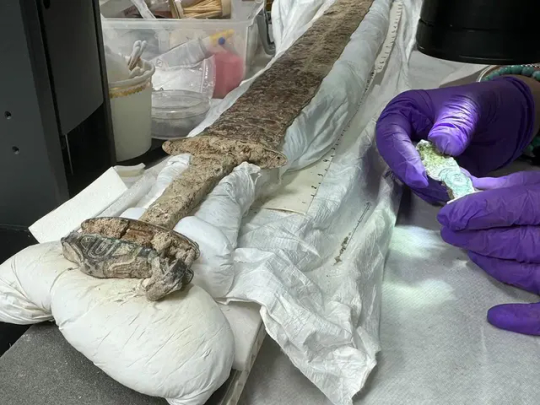
Exceptional Sixth-Century Sword Unearthed in Anglo-Saxon Cemetery in the UK
Archaeologists have uncovered a spectacular sixth-century sword from an Anglo-Saxon cemetery near Canterbury, Kent, in a discovery hailed as one of the most remarkable of its kind. The weapon, distinguished by its exceptional preservation and craftsmanship, is being compared to the famous Sutton Hoo sword found in Suffolk in 1939.
The newly unearthed sword features a silver-and-gilt hilt with intricate decorative patterns and a blade inscribed with runic script. Even the leather-and-wood scabbard, lined with beaver fur, has survived the passage of time. A ring attached to the pommel may symbolize an oath to a king or high-ranking figure, reflecting the weapon’s elite status.
Lead archaeologist Professor Duncan Sayer of the University of Central Lancashire expressed awe at the find. “It’s really incredible, in the top echelons of swords, an elite object in every way. It rivals the swords from Dover and Sutton Hoo,” he said. The Sutton Hoo sword, crafted with gold and cloisonné garnets, is considered a pinnacle of Anglo-Saxon craftsmanship, but this recent discovery stands out for its remarkable condition.

Sutton Hoo Sword.
The cemetery, whose exact location remains undisclosed to protect the site, has so far revealed 12 graves, though researchers estimate it contains up to 200 burials. Male graves have yielded weapons such as spears and shields, while female burials include brooches, buckles, and knives. Notably, the grave containing the sword also held a gold pendant engraved with a serpent or dragon—a type of ornament typically associated with high-status women. Archaeologists suggest it may have been an heirloom or a gift from a female relative.
Other artifacts at the site hint at connections to regions beyond Britain. Scandinavian objects were found in a fifth-century woman’s grave, while items of Frankish origin appear in later burials. These findings illuminate the migration patterns and cultural exchanges following the Roman withdrawal from Britain in the early fifth century.
The excavation has also provided rare insights into Anglo-Saxon funerary customs. Conservator Dana Goodburn-Brown discovered fly pupae on the sword, suggesting the deceased’s body was left exposed for a time before burial, likely to allow loved ones to pay their respects. “So we’re learning something about the funerary practices,” she explained in the upcoming BBC Two series Digging for Britain.
The sword and other artifacts are undergoing conservation and will eventually be displayed at the Folkestone Museum. Prof Alice Roberts, presenter of Digging for Britain, described the site as “an extraordinary Anglo-Saxon cemetery with incredibly furnished graves… The sword is just astonishing.”
By Dario Radley.


#Exceptional Sixth-Century Sword Unearthed in Anglo-Saxon Cemetery in the UK#Canterbury Kent#sword#Sutton Hoo sword#ancient graves#ancient tombs#ancient artifacts#archeology#archeolgst#history#history news#ancient history#ancient culture#ancient civilizations
223 notes
·
View notes
Text
I second the point about Earl Grey - how can Fodlan be an Earl Grey Masterpiece (tm) compared to, say, that silly Engage game, if we have an evil cult of evil racist supremacists who are behind everything wrong (tm) in the world?
Due to Supreme Leader bias or pandering, the devs still wrote the benevolent dragons and their influence to be BaD and needing ReFoRmAtIoN because, uh, reasons - even in VW which is, imo, one of the reasons why this route is so flawed and needed Rhea to die off-screen for the route to ultimately end - which makes the story look really off : if Agarthans are the reason why everything goes wrong in Fodlan (because random people can't even be asses to each other, as Nopes demonstrated, everything was engineered by Agarthans!), why are the Nabateans, depicted as benevolent and helping humans - if not reacting strongly when people try to kill them even if the plot takes great measures not to give them to much light - universally decried - as in, their legacy (the CoS) cannot continue to exist in the way it was at the beginning of the game (you know, when Agarthans and their allies wrre wrecking shit up) and must be "reformed" under Billy's guidance?
Fodlan points at the CoS being "BaD" because characters who diss them are never challenged, because the CoS itself never gets a chance to explain why they do X or Y or the game weirdly frames it as wrong (remember Caspar being upset because people who, uh, tried to rob a site and killed unarmed students are executed???), and ultimately, is always "ReFoRmEd" or "changes" for the "better" at the end of the war.
So, despite showing us all the relative benevolent things they do, given how the narrative pisses on them at every second, the treatment of the CoS is seen as peak "morally earl grey" - when, imo, it's just nonsensical writing made to pretend two lords have a point.
On the opposite end of the spectrum - bar Supreme Leader's skewed priorities in FE16 - we have nothing remotely positive to say/read/discover about Agarthans, they're racial supremacists, they commended a genocide - even if Epi frowns a bit at Thales' methods, he still wants to save and calls Nemesis'n'his Elites "allies" while calling the Nabateans "spawn of the abomination" or "wretches"... -
So we end with one faction the game depicts as "Trust me they BaD even if I always show the inverse" and another as "shown and told to be BaD" - that's where the logical fallacy from the Earl Grey falls apart : if one faction is told to be BaD despite showing things they do that are GoOd, the opposite faction should... also be kind of the same, or at least, not be told and shown to be BaD, right?
I get trying to make Fodlan more interesting and escaping the binary writing of the games and setting by having HC or fanfics giving more meat to Agarthans...
But in the canon material, even if Nopes wasted its WoH paralogue on depicting the Agarthan PoV out of everything they could have came up with, the Agarthans we see (Cleo, Myson, Thales, Kronya Epi, Solon, etc) are relatively one-note and way more nefarious to Fodlan and its people than whatever the Nabateans are presumably doing.
But hey, the Earl Grey veneer regarding the CoS (and Nabateans, because as a race they must be wrong Supreme Leader said so) really took its hold on the fandom (special mention to Rhage!) - It used to annoy me but now I laugh at it, when some people, let it be on YT comments or whatnot complain about the game not showing the dark side of the CoS or the Nabateans doing things that'd make the conflict less one-sided : while they understand the framing of the CoS and Nabs is artificial and hammered without any substance, instead of wondering why this is so artificial, they have the inverse reasoning : the game was afraid of making Rhea/the CoS look bad by not showing the so-called atrocities the totally not biased characters say about them -> believing the totally not biased totes reliable characters over, well, what they can play and see and read in various flavour texts as a player.
"Why don't we see the CoS being more racist and/or forbidding contact with outside, leashing out Gilbert's brother for trading with Albinea?"
Maybe because the person who says the Church promotes isolationism is full of crap and doesn't even know what he is talking about? Even in his end support blurb ?
I'd also say this also is a result of Nopes - which felt, on that regard, a bit more "well-written" than Houses since they dropped (but not totally, it's a Fodlan game after all!) all pretenses of "telling us the CoS is BaD" - Claude and Supreme Leader piss on the CoS ? Fine, let them do their stuff, but AG will have NPCs, characters and supports (Dedue'n'Cat) contradicting everything the other two routes are parroting/saying.
Of course the characters will never be challenged on that front, and Dimitro exists because this is still a Fodlan game - and yet the less "hypocritical" side of the writing is shown in this game : in Golden Shower, we're left wondering for reasons why the CoS needs to be eliminated, Claude's faulty reasonings can be poked with a spoon (even if no one uses any in his army, save for Barney's ominous lines) and it just comes as a one-sided hatred and tantrum an asshat is throwing because, uh, why not, coupled with racist stereotypes and a big dose of "I'm going to remove the outdated customs of that land I'm invading with my army" stench.
Supreme Leader? Does Supreme Leader things, backstabs the CoS - who lent their help when she asked them to lol - and while we witness an assassination attempt from the CoS in this route, well, it's against her, the main instigator of this war, something even Larva spells out! This route ends with the CoS making the big sacrifices to get rid of the big bad (Thales) this path first identified, ignoring Supreme Leader in the process.
So in those two routes littered with various "but Church BaD trust us" we end up with people questionning the Lord who is depicted as a petulant shit head, and... the CoS having a big sacrifice/heroic moment at the end to defeat the bigger foes, the Agarthans.
-> Nopes ends (maybe against its initial will as a game centered on Agarthan narrative?) on a better appreciation/note/feeling for Nabateans and the CoS, despite having two routes siding against them.
Compare with Houses, who always removes Nabateans/Rhea of the picture (except in SS's S support) and brings "reforms" to the CoS - because it needed some, even if we will never know what they are or why those reforms were needed.
If by playing FE16 some people got the feeling Nabateans and Agarthans were, uh, as bad as the other because Supreme Leader said so, those same people might have been frustrated playing Nopes because, hey, in Nopes, the game is more or less telling you that, no, Nabateans try to help protect and save Fodlan, when the Agarthans are hell bent on destroying it and everyone who isn't them!
Mind you, Claude's route made some people feel bad for Nabateans/Rhea/the CoS, because of his insistence that they must be destroyed because "reasons" when all of his assurance that they have to be destroyed comes from thin air and we're shown AND told they aren't... doing the things Claude accuses them for.
Nopes ruins the Earl Grey veneer FE16 built to demonise the CoS, so by extension, if Supreme Leader's priorities have to make some sense in FE16 (funny how Claude can be called an idiot or moron, but Supreme Leader might just be called 'misguided'), the Nabateans have to be a least a bit bad, or really really bad so siding with the Agarthans isn't completely bonkers.
Ergo : For the Agarthans to be a "viable" option to ally with, their common enemies, the Nabateans, must be demonised, even moreso than what FE16 and its subsequent fandom/fanworks tried to because Nopes hammered again that Nabateans are protectors/siding with humans who don't want to fight/war for "reasons".
Tl;Dr : some people cannot accept that their "Earl Grey" masterpiece is pretty straightforward, and all of this "earl grey" exists in their own fanon because they do not like what the canon is telling, and refuse to make the difference between fanon and canon.
I keep thinking about how people want the Agarthans to be victims. Not so much that people are saying they did nothing wrong, but a lesser evil compared to Rhea and the Nabateans. I'd ask myself why people would want such a thing, as even in the route where you side with them they're made out to be evil that will be exterminated, but I wouldn't have to think about why that as. The answer is simple, they validate Edelgard's killing of Rhea.
And, really, it fits with stuff I've seen since the game came out. The people claiming that despite Silver Snow and Verdant Wind being routes where big reveals to the lore are given to the player they, alongside Azure Moon, lie to the player and that Edelgard is the only one to tell them “the truth.” Or that said lore pops out of canon once the player decides to side with Edelgard. They want to ignore that the same route not only paints Edelgard as a liar often enough that a chapter titled “Lady of Deceit” begins and ends with her lying to her army, but also reveals that Edelgard herself knows that her source was an Agarthan puppet yet she is still clinging to that narrative. They'll claim it's all a matter of what the player believes to be true and tell people to disregard the game's creators saying that they built Fodlan to support the story of Silver Snow, and that while Flower is about believing something else, how that leads to not only mowing down everyone who stands in your way because of those beliefs but also ends up with tyranny and oppression under the path of supremacy.
Or we'll get people who ignore that Claude's route talks about how we need to let go of misconceptions we may have about others by getting to know them, and how Claude's misconceptions about the Church may have been caused by the Agarthans feeding him info to turn him against Rhea. No, instead Claude is a manipulative schemer who should have killed Rhea as his final boss after learning about her past and how his ancestors profited off the slaughter of her people, and that Golden Wildfire is who Claude really is and his good route.
Because people want to believe that Houses is this morally grey game, where everyone is a hero from their POV. But let's look at that. As mentioned, Claude's POV blaming the Church is ultimately framed as him having misconceptions, and once he got to know them he realized that Rhea didn't have to be his enemy in achieving his goals. Not only that, he realizes the Agarthans tried to manipulate him like he says they did to Edelgard, and ends up taking them out before finishing off Nemesis. Dimitri's POV is based on his survivor guilt and belief that he needs to live for the sake of avenging those who died. He grows out of this thanks to Byleth teaching him he needs to live for the sake of the living and for himself, all while taking the Agarthans out by complete accident while Edelgard's ideals are presented as demonic while Dimitri's beliefs make him a savior. Meanwhile, Edelgard's POV is based on what her father told her despite her knowing he was an Agarthan puppet. She can't be swayed her path as she tries to lie and manipulate those around her, and the world supports the route where Byleth leads the Black Eagles away from her influence (making it so that the Black Eagles are the only class who can get their story-related character development joining any other class). It's either that, or you ignore the world building to walk a path that is based around hadou, which has negative connotations especially when contrasted with oudou, which is what Dimitri's route is supposed to lead to.
You can ignore this growth if you play Hopes, but Hopes is supposed to show how much of an influence Byleth has on their class and is not supposed to replace that experience. Shez can't give Dimitri or Claude the character growth they would have gotten to see the problems with their POV, nor can they stop the Eagles from supporting Edelgard. Shez just seems to go with whatever the lord says, adapting to the route being played, and as such enables each lord's behavior. Not to mention that Shez is hinted to be from Agartha himself, and even then the Agarthan POV doesn't paint them in a positive light.
So, really, what are people saying when they want the Agarthans to be the sympathetic villains rather than the game wanting us to feel sorry for the Nabateans? That they feel the game not doing so is a flaw despite the Agarthans being so racist that they view everyone else as non-human animals and therefore it's okay to experiment on them? That we should support their genocide of the Nabateans because Edelgard said things used to be better despite the reveal that they're the ones who gave mankind Crests while making themselves out to be gods? We should still think that the Church are the bad guys when the Agarthans are the ones behind the experiments, Duscur, the death of Claude's uncle, and so much more? Or that Nemesis was a good king who was demonized by history rather than the power-hungry asshole he's depicted as, the only real misconceptiont here was that he ever was a hero in the first place rather than the tyrannical bandit he actually was.
In the end, it's just people not wanting to let go of their own misconceptions about Fodlan. They don't want to see Fodlan for how it really is. If anything, Houses can serve as a deconstruction of the idea of Death of the Author. It's a game with some very direct messages, but the routes where the player diverges away from those messages (Flower and the entirety of Three Hopes) it leads to bad endings because, at the end of the day, Fodlan was built around those messages. It was built about the need to see people for who they really are rather than who we think they are, as Edelgard being revealed not to be the heroine but rather the villain is the twist of the game who needs to be removed from power. Also that people supporting each other is a far better outcome than everyone being left to fend for themselves, especially when the people at the top use their power to benefit others. But it's up to people to do that themselves, to figure things out for themselves rather than fall into the trap.
Otherwise, we're left with people defending the likes of the Agarthans.
#fantasyinvader#3 nopes#to think i'd call the writing of this game better than trashtier lol#at least it's more honest#sure some characters are cheerleaders and all#but the main plotbeats remain#Barney is the one who wonders if Claude's plan is going to work and Claude gives some idk man#his s support in FE16 always miffed me but I guess we will have to disagree on FE16!Claude#Nopes has Yuri who lampshades without voicing it bcs Fodlan how the CoS' role of providing a roof and food to people is important#and we even have Mark the NPC who refutes all claims of corruption in the central church#and Bobby the Alliance loldier who realises all those things they were told about the CoS being evil were nonsense#2 NPCs and an offhand dialogue? Is better than FE16's entire script#regarding the CoS and what it does for people#maybe maybe we can say there's the CS line where Dimitri finds it nice of the Abyss is a place to welcome people who have nowhere else to g#even if this exchanges lampshades how Claude is completely out of touch with the topic#and gives a Supreme Witty Comment instead#granted at this point of the game he might not know poor people and orphaned children exist in Almyra so...#which is also wtf#FE16#TFW Nopes that is supposed to be written from an Agarthan standpoint ends up being more sympathetical to the Nabateans than FE16
23 notes
·
View notes
Text
Compilation post of the Rhaenicent Quotes in the House of the Dragon Season 2 Companion Book
The Companion Book discusses various aspects of the making of season 2, such as production, set design, costuming, writing and acting. In this post I will compile all the quotes that make reference to Rhaenicent. The quotes are below the cut.
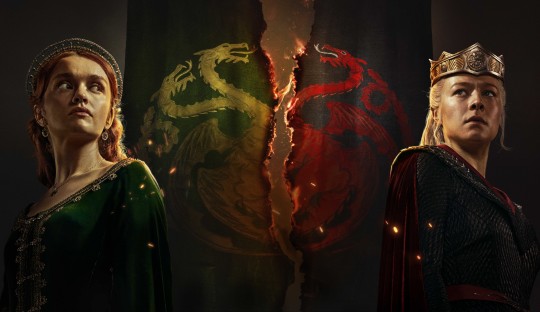
Quotes on Rhaenicent in season 1
Expertly crafted, the first season breathed visceral life into an essential chapter in the history of Westeros by foregrounding the experiences of childhood friends turned reluctant adversaries Rhaenyra Targaryen and Alicent Hightower.
Hess was keen to explore the ways in which the patriarchy impacted the world of Westeros, and how circumstances conspired to drive an ever-greater wedge between the show's central protagonists, Rhaenyra and Alicent.
As the scripts came together, the two characters became the principal lens through which the episodes unfolded. Alicent and Viserys's marriage leaves Rhaenyra feeling betrayed, while Rhaenyra's brazen indifference to societal dictates infuriates Alicent.
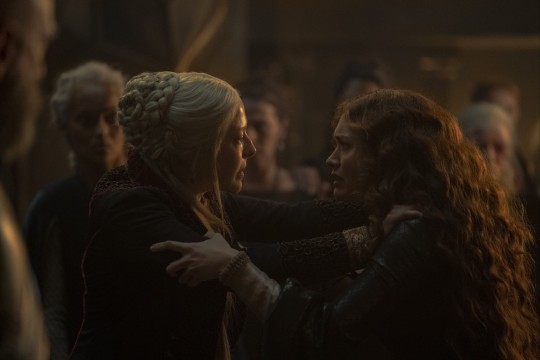
Quote on Rhaenicent at the start of season 2
Both sides, too, appear largely determined to ignore the wisdom of the women in their midst. Despite having been crowned queen in an impromptu ceremony at Dragonstone, Rhaenyra struggles to fully assert her authority over the men who serve on her Black Council, many of whom simply wish for her to step aside so they might enact their own plans. At the Red Keep, Alicent, too, is ignored and dismissed by her sons and her father, who disregard her considerable political savvy and her years of experience serving on Viserys's Small Council.
Quotes on Rhaenyra and Alicent's arcs in season 2
For the writers, the characters' arcs were a means to continue their exploration of House of the Dragon's powerful central theme—that the patriarchy would rather destroy itself than see woman on the throne. "Rhaenyra is beginning to understand that even though she's the queen, it doesn't really matter," Hess says. "Because she's a woman, she's seen as a figurehead, not somebody who's actually in control. Alicent is realizing, Oh, I'm entirely disposable once the men are in charge. The season is about them coming to active reckoning with the patriarchy."
Adds Condal: "Alicent and Rhaenyra were doing much better in a time of peace and prosperity, when you could have more nuanced arguments about what power is and who should be in power. But once it becomes a real war, the men who trained their entire life for this expect to step up to the front of the table and say, 'Thank you very much, but this is what we're going to do now.'"
Quote on set design
In the second season, the young queen (Helaena) moves into Alicent's former chambers, while Alicent, now Queen Dowager, takes over Rhaenyra's former living quarters.
Quote on Rhaenyra and Mysaria that makes reference to Alicent
"Rhaenyra hasn't had a friend that she can be real with in a long time," Hess says.
Introduction to the Sept scene
"The Burning Mill" also afforded D'Arcy and Cooke a rare opportunity to work together, as the hour concludes with a confrontation between Rhaenyra and Alicent, one of only two scenes between the characters in the second season. The scene unfolds inside King's Landing's Grand Sept, where the Queen Dowager has gone to pray. Rhaenyra disguised as a septa, kneels next to her, and their tense exchange begins.
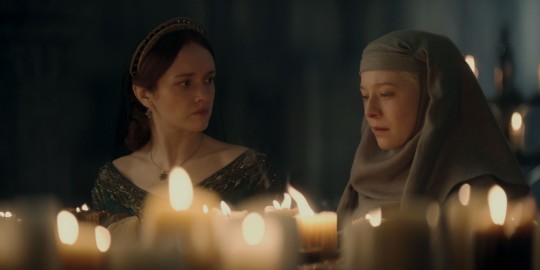
On writing the Sept scene
As he was writing the episode, Hancock, knowing the import of the sequence, worked in concert with Hess on the conversation in which the women finally express to one another their feelings of anger, suspicion, and resentment. "'It's not that either has betrayed the other,"' Hess says. "It's that all this stuff has happened that the men around them have facilitated, and now they don't know what to think about each other. There's this displaced fury, and they end up trying to fight it out with each other. That's often how women in high-powered positions are made to feel about each other—to be suspicious of each other and to struggle with one another over things that they should be [in agreement on]."
Input from Emma and Olivia on the Sept scene
During the period of rehearsals prior to the beginning of the shoot, D'Arcy and Cooke weighed in on the emotions their characters would likely be experiencing, and Hess made a point to reshape the sequence based on their feedback. "They both felt they could get more visceral and angrier," she says, "like, if they weren't who they were and in a sept, they would be punching each other."
The importance of the Sept for Rhaenicent
Setting the meeting inside the Grand Sept gave the scenes additional weight, as the characters had been present in the space together only once before: In the first season, a teenage Alicent brings her best friend there to help her process her grief over her mother's death.
Rhaenyra's point of view on the Sept scene
The fact that Rhaenyra makes the trip to the capital at all is a dangerous gamble, "It's quite a chaotic choice," says D'Arcy. "There's some slight irrational thinking going on and maybe a little bit of self-destructive tendency as well. I have this sense that part of her wants forgiveness. I think she also wants to look the person who's caused her such pain in the face and to declare it. I really loved that scene because while trying to negotiate as an adult on behalf of the kingdom, you also watch two children try to reconcile so much painful feeling."
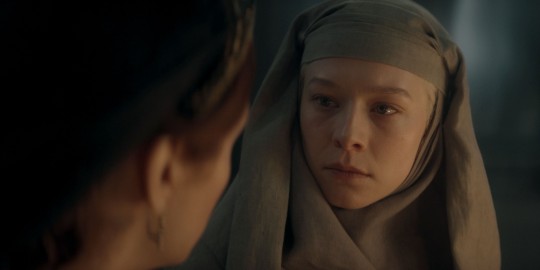
Alicent's point of view on the Sept scene
Cooke played the scene as though Alicent still feels a deep and abiding love for her childhood best friend, despite all the pain and tragedy they've both experienced. "They grew up pretty much as sisters, and that is hard to break," Cooke says. "I think they both can tell when the other is lying or postulating. This feels like a complete breakdown of any pretense. They are showing each other their most honest and vulnerable side. They have this back-and-forth about what Viserys's intentions were and this discovery of what he wanted."
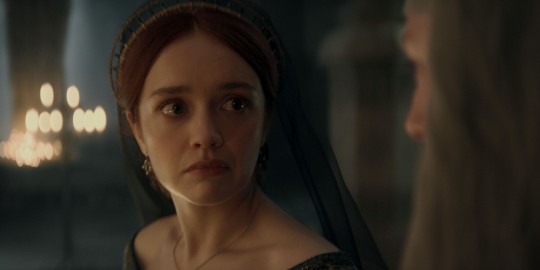
Aftermath of the Sept scene for Rhaenyra and Alicent
Each woman leaves the encounter in the Grand Sept fundamentally changed. Rhaenyra arrives harboring doubts that Viserys had indeed wished for his son, Aegon, to follow him onto the Iron Throne. But hearing Alicent allude to the prophecy of the Prince That Was Promised she feels newfound surety about the path forward. "For the first time, she has to choose it for herself," D'Arcy says of Rhaenyra's destiny. "Suddenly, there's this decision to kill the possibility that anyone else truly has the heirdom, and that causes her to reckon finally with going to war. She chooses her title. She doesn't just inherit it."
Alicent, meanwhile, is confused and confounded to discover that Viserys might have been referring to Aegon the Conqueror as he drew his last breath. "This throws Alicent's world into complete chaos," Cooke says. "She's been so solid in what she heard. That story, and what she's told herself, has given her such strength, even in the eyes of people that think she's completely out for her own gain."
Quote from Olivia on shooting scenes with Emma
During the shoot, Cooke found herself wishing she and D'Arcy could perform together more often, "It was great working with Emma," Cooke says. "lt's too few and far between [our scenes]. I get stolen snippets with them, but it's always so wonderful and juicy."
Rhaenicent parallel storylines in episode 2x05
As Alicent is undermined in the Red Keep, Rhaenyra is faring little better on Dragonstone.
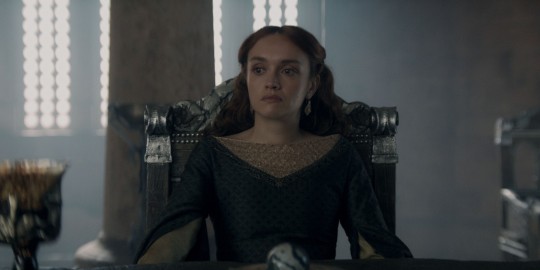
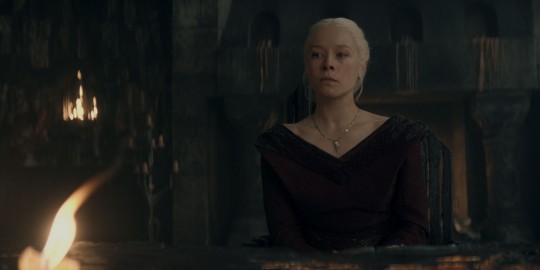
Alicent's decision at the Lake to go to Dragonstone
"Alicent has lost pretty much everything—any power, any legitimacy that she held—and war is afoot," Cooke says. "I genuinely don't think she believes that [the Greens] can win, and I think she believes that they shouldn't win. She wholeheartedly believes that she got it wrong. Her need to escape King's Landing is to get some clarity on the situation and try to figure out what she needs to do."
Quote on the Dragonstone meeting
In the episode's final moments, Rhaenyra has a second fateful encounter: She returns to Dragonstone and, to her surprise, finds Alicent proposing an arrangement by which the Blacks could take the throne with minimal bloodshed. Set inside the Valyrian scroll library in Dragonstone, the sequence finds Alicent advising Rhaenyra that Aemond will leave the Red Keep to join Cole in the Riverlands on the march to Harrenhal. At that point, Helaena as Queen Regent could command the guards to lay down their arms, allowing Rhaenyra to take the castle. In return, Alicent asks that Rhaenyra allow her to live out her days with Helaena in the countryside. Aegon will need to be executed, Alicent acknowledges, but she believes his sacrifice is necessary to avoid war.
Alicent's decision to petition Rhaenyra
"It's massive that Alicent travels to Rhaenyra," Cooke says. "It's treason. If Aemond found out that she'd gone, [her] head [would be] on a spike. But it's to petition the friendship that she and Rhaenyra once had. It's to look Rhaenyra in the eye and be like, 'I'm not lying. This is me as my rawest self. This is me shedding whatever power or queenly status I had. It's yours. I was wrong. I don't want anything to do with it. I'm done. I'm tired, I'm so exhausted. Let me and Helaena go off and live in the countryside with a couple of chickens and a cow."
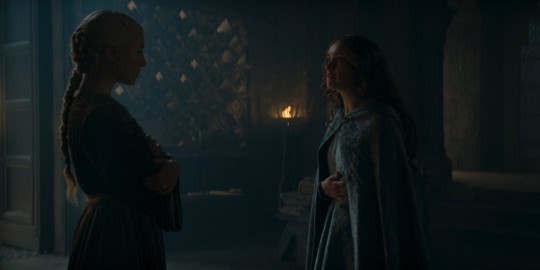
Ryan Condal on the decision to end the season on the Dragonstone meeting
For Condal, bringing Rhaenyra and Alicent together one last time was an ideal way to conclude the season, to remind viewers of the women's role in the narrative and their inextricable links to each other.
On Rhaenyra and Alicent's contrasting character arcs in season 2
"You have two characters who have these wildly divergent arcs [and they] come back around at the end to again find themselves on one another's doorstep," Condal says. "Rhaenyra has seen this meteoric ascent over the course of the season. She's gone from somewhat of a beggar queen, who is crowned on a hill, to a leader of an army of dragons and of men. Alicent began the season having put her blood on the throne, the thing that she sacrificed her youth and body to do. But she comes to a place where she is now looking at the cost of the choices that she's made and wondering what it was all for. She's realizing that neither of her sons is suited to rule the realm, and she wants to stop the spinning wheel that is the game of thrones."
On the filming of the Dragonstone meeting
Two days near the end of the production schedule were set aside to film the weighty scene, so that D'Arcy and Cooke would have enough time to thoroughly explore how their characters might react to such an unexpected turn of events. "The way we prepared for it was, they both came to the scene without a rehearsal so that they would be able to start fresh and feel things in the moment," Patel says.
On Alicent's choice to sacrifice Aegon
The trio agreed that for the scene to work, the audience would need to truly understand Alicent's motivations for risking so much in reaching out to Rhaenyra. "Alicent found herself in Episode 7, and who she found is someone who is honorable," Patel says. "Her honor lies in being responsible for her actions, and she knew that she had misunderstood Viserys on his deathbed, and because of that Aegon was now king. She needed to set the record straight and do the right thing."
On Alicent's love for her son Aegon
They also set about finding ways to convey that despite how deeply disappointed Alicent is in Aegon, how turbulent their relationship has been, deep down, she still loves him. Thus, the idea of offering his life to Rhaenyra was unimaginably fraught. "The entire season was going to end on this hinge, so for that to be effective, we needed to believe that she loved her son and that it was truly high stakes," Patel says, "It was important to feel that unconditional love of a mother that is hard to describe."
The aftermath of Alicent's choice in season 3
"The entire season finale hangs on the cliff of Alicent telling Rhaenyra, 'I'm going to give you son for a son,'" Patel adds. "But what she doesn't realize is that the son she has promised has escaped."
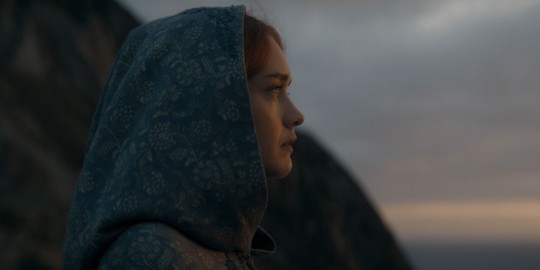
Hints for Rhaenicent in season 3
Amid the beautifully realized fantasy trappings, the family drama—grounded in themes of love, loyalty, and betrayal—remained the central focus, with Rhaenyra and Alicent continuing to serve as the fulcrum of the narrative. "They still have quite a bit to learn about who they are as people, and how far they're willing to go for their goals, whether those are personal goals or familial goals in either pursuing the throne and ambition, or protecting their blood," says showrunner Ryan J. Condal. "They both realize, certainly, that they are living through a historical period in this world."
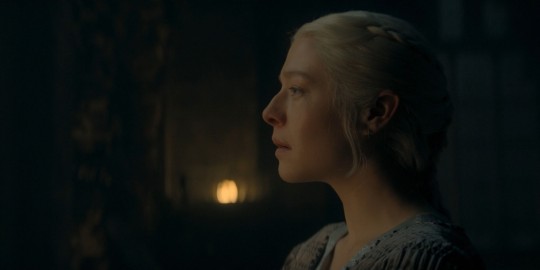
Miscellaneous:
Picture descriptions
Olivia Cooke (left) and Emma D'Arcy filming Alicent and Rhaenyra's confrontation. (2x03)
A suspicious Rhaenyra (D'Arcy) greets her estranged best friend (Cooke). (2x08)
A quote from Sara Hess comparing Rhaenyra and Alicent to Sharako Lohar
"She's operating outside the system. Rhaenyra and Alicent are so much struggling with the patriarchy, it was super refreshing to have a woman who's like, Fuck everything."
#rhaenicent#alicent hightower#rhaenyra targaryen#hotd#house of the dragon#hotd spoilers#hotd companion book#pinned#super interesting to make this hope y'all like it <3#i am looking forward to reading companion book 1 as well and seeing how quotes about rhaenicent differ#this took me super long to make rip hope it looks good the picture load slowly but yeah <3#olivia cooke#emma d'arcy
143 notes
·
View notes
Note
hello! hope you're having a good day :)
I'm slowly introducing my girlfriend to arthurian legend and I was wondering what films you would recommend for a complete beginner (her). I will be next to her explaining things but I also wanted to start off with something more digestible. We've already watched the green knight (2021) (I know) and excalibur (1981) together. thank you for all you do!
Hello, I am and I hope you are too!
Oh yayyy this is so awesome. I'm going to suggest things that I personally feel really give a newbie a grasp of the characters in such a way that if they were to watch something else afterward, it would actually aid them in understanding. There are some films that are so experimental they're unrecognizable (like Knightriders (1981) or Shadow of the Raven (1988)). Those are amazing, visionary films. But they're entrenched in their respective cultures (American and Icelandic respectively) so they don't really help someone new grasp the foundational lore like the things I'll be suggesting will. This list offers self-contained stories with solid writing, great acting, and entertainment enough to keep one engaged, without any requirement for prior knowledge to appreciate.
Here are the beginner friendly options listed in order of release:
Knights of the Round Table (1953)
Details the rise & fall of Camelot from Arthur pulling the sword from the stone to his & Mordred's deaths. It has everything, the A/G/L of all time, adorable Percival & Elaine as siblings, Orkney bros Gawain, Agravaine, Gareth, & Mordred (who is not a product of incest), sassy clever Morgan beefing with fatherly sweet Merlin, gorgeous costuming, moving script.
BBC The Legend of King Arthur (1979)
This is technically a show but hear me out. It's only 8 episodes, half hour each, & covers the full Arthurian story from Uther's battle with Gorlois to take Igraine all the way to Arthur's passing. Morgan is a central character & fascinating. Arthur raised by Ector alongside Kay. Goes to battle against Lot & Accolon & the other rebellious lords. Great Lancelot & Bors. Guinevere is strong & interesting & sympathetic. Orkney bros Gawain, Agravain, Gareth, & Mordred (who is not a product of incest). Elaine of Corbenic & Elaine of Astolat both present as separate women. Grail quest led by Galahad (no Percival unfortunately). Mador’s brother Guido poisoned “by Guinevere” like in Le Morte d’Arthur & a trial by combat ensues. It’s a really compelling version of events that can give a beginner a great overview of the legends.
Sword of Lancelot (1963)
Opens with an older Arthur looking to marry. Lancelot is his bestie & champion. Other knights include Gawain, Mordred (who is not a product of incest), Bedivere, Dagonet the jester, Lamorak, Kay the seneschal, & eventually Tor. Lancelot/Guinevere have great chemistry they were married irl.
Gawain and the Green Knight (1991)
Faithful adaptation of SGATGK complete with three days of kissing! Unique by having Gawain recount the reason for his journey as he’s already on it. Flashbacks show Gawain at the high table with Arthur & Guinevere, sitting next to his brother Agravaine, when the Green Knight comes in, & is beheaded. The events at Bertilak’s castle play out just like the poem with the lady coming to tempt Gawain & then he forwards those kisses to Bertilak in exchange for the animal of the hunt. Colorful & fun!
Tristan & Isolde (2006)
One of my favorites. I think the leads have great chemistry & gives a decent overview of the Medieval story without too much access. Mark here is morally way better than in Medlit but it does make the live triangle more juicy. Brangain is really funny here too. There is no magic in this version, so no love potion. Just pure unaided adultery.
Sir Lanval (2011)
Short & sweet indie movie adapting Marie of France’s lay of the same name. Great casting, beautiful costuming, pretty sets. Lanval’s rags to riches story thanks to his fairy lady Tryamour. Sport but well-meaning Arthur not doing his marital duties gives Guinevere sufficient motivation to try & seduce Lanval. Kay is here as Arthur’s foster brother & seneschal but sort of acts like an attorney? Lol? Great movie.
Sire Gauvain et le Chevalier Vert (2014)
Another SGATGK poem adaptation, this time in French (with English subtitles) & condensed to a mere 28 minutes run time. Visually stunning & beautifully acted. A little more mature than the 1991 version, bc of course the French have to get freaky with it sexual style (this is a good thing). Another awesome adaptation worth checking out.
Okay I think those are all my suggestions! Hope that gives you and your girlfriend a solid watch list and you both enjoy them. Take care!
#arthuriana#arthurian legend#arthurian mythology#king arthur#queen guinevere#sir lancelot#sir gawain#morgan le fay#sir mordred#sir lanval#ask#mordred-galahad
47 notes
·
View notes
Text
Daddy Issues in Like Minds: Sally and Martin Edition
As a fandom, we have extensively discussed Alex and Nigel and their daddy issues from a number of different angles. The other day I was considering this central theme and the post I made about it here: The Sins of the Father.
It occurred to me that both Sally and Martin are also caught in the same trap, unable to escape the legacy of their own fathers.
Martin McKenzie:
By inheriting his profession from his father, he is in some ways simply a copy of his own dad, following the same path and attempting to follow his dad's moral and professional code. At the same time, he also inherits membership in the Order and the expectations that come with it. When Dr. Forbes presses him to release Alex, those expectations come into play. Dr. Forbes chides him for not following along with the script, as his father would have done. Martin asserts that his father would have done his job properly, abiding by the rule of law. In the end, it's not clear which of them has the correct assessment of Daddy McKenzie, and given what we know of the Order, I think either thing could be true--or both are.
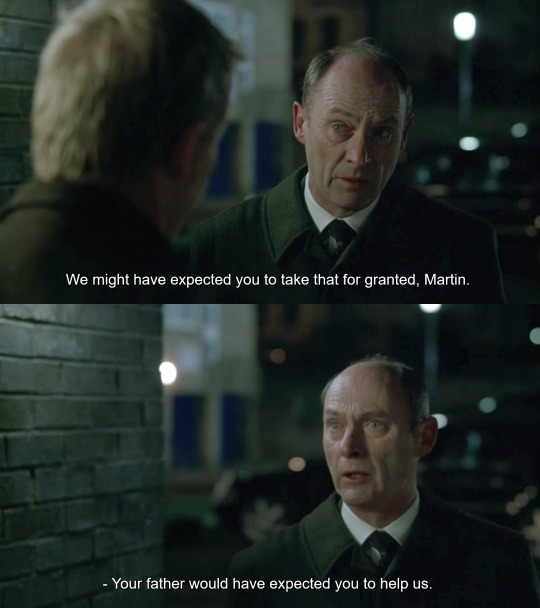
While Martin chooses to adhere to his faith in his father's sense of duty to the law, either way he chooses, he's still caught up in Daddy McKenzie's legacy--and perhaps, his sins. Ian's confidence that Martin would help a fellow Brother indicates that this IS a standard practice among members of the Order. The way he phrases it even suggests that he personally knew Daddy McKenzie and perhaps had examples of Dad's past behavior as his basis for the assumption and the belief that Martin would behave similarly. Martin might have an idealized version of his father up on a pedestal when it is entirely plausible and even probable that the man was guilty of bending and breaking the law to aid the brotherhood.
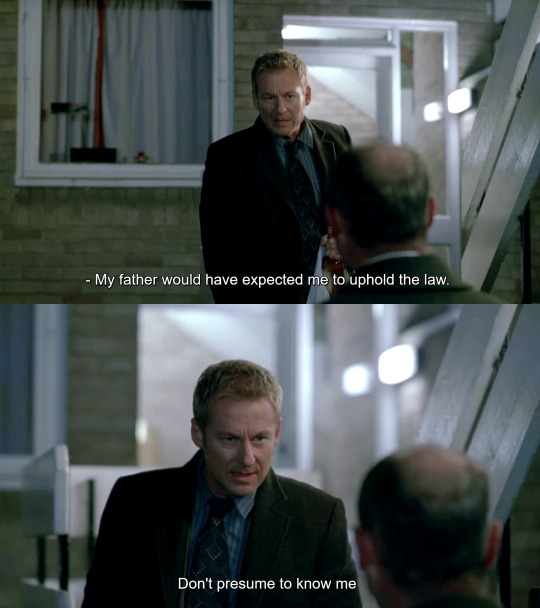
Is Martin upholding or subverting his father's real legacy? Can Ian presume to know the son by the actions of the father? In the end, Martin renounces membership in the Order, but does he actually escape his father's sins? Isn't he just as willing to bend the law to suit his own purposes? He takes an immediate disliking to Alex, decides that Alex is guilty, and charges him with no solid evidence to avoid having to let him go. He calls Sally in and pressures her to "find him culpable". This is a gross undermining of the due process of law. He won't break the rules for the sake of the brotherhood, but he has already broken them extensively for his own purposes. He has deluded himself into a self-righteous belief in his own ethical rectitude, but he merely repeats his own father's sins in the service of a different cause. Perhaps that IS his father's true legacy...and sin.
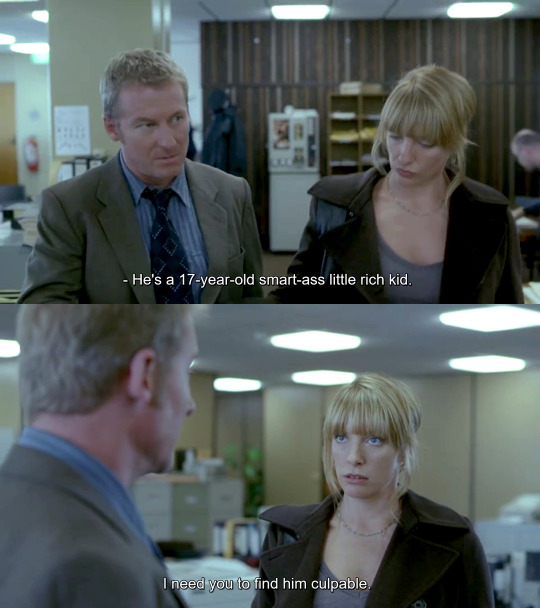
Sally Rowe:
We're given much less material to work with pertaining to Sally and her father, but the key piece of info we do get feels very illuminating. When Sally is trying to go home and her car won't start, she opens the hood herself and tinkers with what seems to be the distributor cap*. From her lack of hesitation and confidence in pulling the cap off, we can guess she's had this problem before and fixed it herself. Dr. Forbes offers assistance and they have a brief exchange in which she explains that she inherited a passion for difficult cars from her dad.
Sally's dad imparted both a knowledge and a love of cars, including a particular fondness for types that are prone to frequent mechanical problems. She doesn't just have an interest in these cars, it's a "passion" for them. One can surmise this was a pastime they shared as a bonding activity, Sally shadowing her dad as he fixed the latest problem in his favorite car. One might be tempted to say that Daddy Rowe's legacy then was one of empowerment for his daughter, encouraging her to occupy traditional male spaces and giving her the skills to solve issues that most people need to pay a skilled professional to handle.
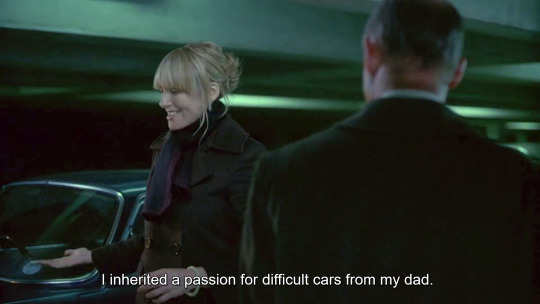
I think this trait gives us a window into Sally's psyche far beyond just an automobile hobby. Her passion for "difficult" cars--cars that break down frequently, cars that are tricky, unreliable, and temperamental, cars that can turn on you and leave you stranded a hundred miles from home--feels like a character trait that applies to more than just cars. It gives us a window into the inner forces that led her to choose a career in forensic psychology. Her job duties entail a careful examination of "difficult" people in order to diagnose problems and offer an assessment to law enforcement to determine legal next steps. Sally is effectively opening the hood and tinkering around with the complex human mind to determine the functional status of each patient.
A piece of advice from a practicing forensic psychologist to those who are considering the career:
You have to be able to convey your thinking into well-written, well integrated, and professional reports that will be read by judges, attorneys, clients, and other professionals involved in the case. You need to have a complex understanding of personality adjustment, psychological assessment, the law and the legal process, the relevant literature, and be attuned to one’s limitations in forming opinions.
I find the last portion particularly relevant here. While her instincts led her to choose this profession, they also present a type of limitation to her ability to objectively assess patients. She doesn't just want to fix a car when it breaks, she has a "passion" for the ones that break down often. Most people would want to get rid of a car that had frequent issues, deeming them more trouble than they are worth. But Sally is drawn to problematic cars--and people. There is a subjectivity inherent to her interest in the cars/people with frequent problems which drives her to remain attached when others would give them up as a lost cause.
This trait underlies her entire interaction with Alex, and I think it plays a major role in her downfall. In this post, I examine all the ways that Martin and Alex are very much alike. I would also suggest that their similarity is why Sally was/is drawn to both of them. We know Sally and Martin were previously in a relationship, though that has ended prior to the film's events. Regardless, Martin demonstrates that he at least still knows Sally well enough to push her buttons and enlist her help with his cause. Upon meeting her, Alex immediately starts to probe this woman in an attempt to find her weak spots so he can manipulate her for his own ends. Sally has a similar reaction to both of them, essentially conveying that she sees through their patently obvious attempts to influence her. Her ability to recognize their problematic behavior doesn't actually stop her from caving to their wishes--she cannot resist the "difficult" cars.
It seems likely that most others in her position would have given up on Alex after hearing even a part of his frankly preposterous claims, deeming him beyond the point of any repair. Sally is blind to her own limitations - the tenacious to a fault need to figure out the problem and fix it - and this impedes her ability to remain objective. Her satisfaction at solving the problem is on display as she presents her analysis to her peers--she basks in the pleasure of diagnosing this complex psychological dynamic and preens at the recognition she receives for it. And with poetically perfect timing, while she stands at the highest point in her professional career, Alex reveals that she has been deeply deceived. All her satisfaction at having solved the problem and "fixing the car" comes crashing down in the realization that she was so very wrong. The instincts instilled by her father, rippling outwards from this simple hobby into her personal and professional life, are what cause her downfall.
In Like Minds, there is no escaping your father's legacy.

[*Distributor cap source: I was raised in a family of mechanics including my own father, and I have pulled off a distributor cap to check the cap and the spark plugs when my car was having trouble starting. Feel free to look up pics of the distributor caps to verify my assertion (you won't).]
[Like Minds Masterpost - Main]
#trying desperately to get sources on more images in nigel's book but a few of them are proving problematic so here's a very random post#no one:#me: let's deep dive into sally and martin's character flaws#like minds#alex forbes#like minds analysis#murderous intent#like minds 2006#sally rowe#martin mckenzie#ian forbes#toni collette#richard roxburgh#patrick malahide#i'm sure there's a huuuuge roxburgh and malahide fandom on tumblr
35 notes
·
View notes
Text
Had a little exchange with a client that started fine, she was sorry to see me go because I'm quitting my job. I thanked her and said I enjoyed working for her too, but the work was causing me health issues and was not doable with my disabilities. I said I was starting a new job right away, a desk job which will be a nice rest for me. And then she said "oh I understand, I too realized that health is really important and need to be protected when I had children. It's such hard work, you need to be physically prepared. Do you have children?" And I said no. The usual awkward silence happened. My concerns for my own health and comfort suddenly appearing selfish and unjustified. She said "oh well, you still have time, how old are you?" They always say that because they think I'm 25 or something. I said "I'm 34." Another awkward silence. "Well uh, you never know, you'll probably want to have children someday and you'll need all the preparation you can get right?" Why? Why can't a woman prioritise her health for the sake of it? Why does it have to be in anticipation of mandatory motherhood, the great martyrdom? Feels like being prepared for a ritual sacrifice. Rest, eat, be beautiful and adorned before they chop your head off. In some culture they literally force-feed the bride to fatten her up before the wedding. They'll make foie gras out of you. Made me think of that post saying the most feminist thing a woman can do is refuse to suffer. I'm quitting because I refuse to suffer any longer. The end goal is not to be better at suffering later on. It's not to suffer at all. And somehow they'll make you feel selfish for it.
And one last thing, it's the awkward pause everytime I say I don't have kids. A lot of women try to bond with other women not by talking about common interests, opinions, hobbies, it's just "do you have kids?" and the expectant "yes" which prompts the following script "how many? What age? Boy or girl? Which school?" And on and on. And you can understand why, their kids are central to their lives and it's a sacrifice they expect, even wish to share with other women. So when the answer is no they don't know what to say next. They say nothing. I used to justify myself "no, I never wanted it for some reason, I'm fine with them I've worked with children, I just never wanted to have any." Now I just say "no :)" and it's a conversation killer.
332 notes
·
View notes
Text
Game Pile: For The Queers
For the Queers is a Descended from the Queen game, which is focused on developing queer relationship dynamics, at least, according to its copy text. It was produced by Scholastic Dragon Games and it’s available on itch.io and it’s in that particular category of $3 print-and-play games. Its presentation is a little ropy, it’s not exactly a looker of a game, and I don’t feel like it’s reasonable to pick on it for looking like it was made in Google Docs.
It is a challenging comparison to strike, though, because For The Queers is modelled on the storytelling pseudo-TTRPG, ‘For The Queen,’ a storytelling card game lauded for being, well, pretty solid, and for what amounts to a game of sitting around in a circle telling stories, it has a truly beautiful presentation and excellent approach. In addition to its sumptuous visuals, For the Queen is extremely well constructed in terms of its approach.
It’s built around a single deck of cards that’s set up so the first time you start the game, it’s already in order to teach you how to play the game and get you playing the game in the same fluid exchange. You just flip the cards off the top and go around reading them, in turn, for each player, until suddenly a card asks a player a question and they need to answer it. Using these questions, the players then construct a narrative, integrating the answers to one another’s questions, all building up to a dramatic conclusion to the whole narrative with a final card that, in For The Queen, is simply ‘The Queen Is Under Attack: Do you defend her?’
Everyone answers.
Game ends.
For The Queen, which is already such a simple game engine that it’s functionally impossible to control access to, has a SRD, a system reference document. You can make your own games that invoke it and use the same engine, which, like, you can do that anyway, because game rules are not copyrightable, but if you do it this way, with the SRD and invoking its branding, then you can connect your game to For The Queen, which is, you know, that’s cool. I like that, because it means that you can openly and directly show connections between games. Good stuff.
The central relationship in the story of For The Queers is that the characters are all given a central truth to their prompts: You are in the retinue of a royal, the Queen, who is ‘free of gender,’ and they are travelling with you to again, to journey to a distant land to broker an alliance, but also, this queen, they hold your heart. You are in their retinue, and they love you.
There’s a deeply different materiality to this game being a print-and-play of a paper sheet and an ordinary deck of playing cards. The game For the Queers is modelled on makes sure the deck of cards gets to be this enchanted device, a physically perfect device that controls the focus entirely. You flip a card, and that card presents the question. The art of the Queen in that game gets to be centralised and all the players are engaging with the question in front of them and only the question in front of them.
By comparison, For the Queers requires you look at the card flipped, then a lookup table, which is multiple pages long, and which has all the questions on it present ahead of time, meaning that it’s not hard for a player to mistakenly look at a question that they’re not ‘meant’ to (and isn’t even necessarily going to show up in the game), colouring their experience of the question.
It’s a testament to how a game system is not just the system but also how that system is presented. By putting the rules material in the most convenient to make form (a big a4/letter-printable sheet), the game is diminished in how it presents things that aren’t relevant to the players in the play experience. It’s hardly a real problem either — after all, there are a host of different ways you can approach this. Heck, the whole thing could be a very convenient web applet, just a website you press a ‘next card’ button on, using a simple script to randomise the prompt.
The form the game takes informs the way the game plays.
For The Queers is a For The Queen variant that promises a focus on ‘queer relationships,’ which is a really loaded place to start with things in a way that makes me pre-emptively grimace emoji. Queer relationships are massively varied; my marriage to my partner of twenty years is a queer relationship which has never been particularly in any way interesting, but so to is the relationship of one of my friends who has a literal spreadsheet to manage the intersecting commitments of their different alters’ different polycules. Capturing the breadth of those things in a game simulation of this engine runs a risk of failing to catch either end.
After all, I am one of The Queers, and reading this game’s prompts, I found myself struck by how much none of these questions invited interesting answers, or, particularly, were informed by The Queerness. Now, of course I’m not going to be a great eye level character here; after all, in a podcast about Disney movies, I routinely called out how often the narrative of every movie was a terrible relationship and everyone deserved to be guillotined, but I like to think I can suspend my sense of disbelief and personal politics easily enough to engage with the game that exists in terms of its narrative framing. This is about people who are doing something very important generally (helping the Queen on their way to trying to save the kingdom through an alliance) and very important specifically (you are travelling with someone you are in love with and the many other people that they love, and dealing with the boundaries of that).
Which means that the most prominent form of queerness this game forwards is polyamry and being loved by a queen who is ‘free of gender,’ and what that means is an exercise for the reader. The polyamry element as a form of queerness is, you know, fine, I’m not one of the people who thinks polyamry doesn’t count as a queerness, it’s something that heteronormativity wants to attack and disempower, they can come in under the umbrella as long as they want to be. But that’s kind of the extent of queerness in this space, and since we are also talking about a gender-unclarified queen, with literally no other world building information imposed, that’s kind of the limits of what kind of queerness the game and its story mechanics actually include.
In some ways, it feels breathtakingly sweet, that this game feels its vision of queer relationships are the natural outcome of what happens when you play this game, with these rules. It speaks to the idea of a player community where there is no need for anything but the natural outcome of these prompts to be a queer relationship, because queer relationships are that obvious and easy, but also, the queerness is not defined by any kind of norm. It is Queer, because it says it is Queer.
Like, you know, Dungeons & Dragons.
Let me be extremely clear on this game, though: For all that this game has this verbiage out of me about its challenge, about the things I think it mis-steps on mechanically to achieve its ends, and the implications of what it chooses to be about, none of this is to dismiss the game as a game for its own sake. You can get this game for $3 and play it and if you play it with a bunch of people who want to tell stories about messy queers entangled around their royal love, grappling with their feelings and despairs, you will absolutely be able to have a good time!
Check it out on PRESS.exe to see it with images and links!
29 notes
·
View notes
Text
Coming October 18th: The TTT's DOUBLE FEATURE at the Dance of the Dead!
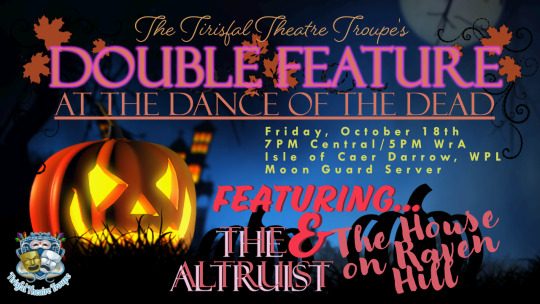
(Original background from Quince Media via Pixabay, free-for-use license terms apply) An all too familiar chill is in the air, and the dead rise again to march in solidarity with their brethren. The Dance of the Dead, an event hosted for many, many years by the Undercity Nexus crew over in Caer Darrow, has returned once more this year! Last year, the Tirisfal Theatre was proud to perform on stage for them, and we return once more this year with gusto! Join us on October 18th over on the blood-soaked isle of Caer Darrow, and come to the burned down house across from the fountain at the town's center as we take you on a haunted house tour you won't soon forget with two tales of horrific homes gone wrong! That's right, it'll be like HGTV - but with affordable property! Our first offering of the evening is our delightful horror comedy show based on a chilling song by Jonathan Coulton, where an aspiring real-estate investor attempts to flip his first property. As he is fixing the place up to be sold for a pretty copper, he soon realizes it came with a resident already inside - and it's happy to see him! A little too happy... Will our everyman find a way to make his fortune on this old home? Or will he decide to throw it all away and destroy everything he worked for?

My guess is the latter... Find out, as we explore the horror of the creepy doll in...
THE HOUSE ON RAVEN HILL!
Then, stick around for a story that will chill you to the bone, as we go back in time to an era long ago. A wealthy Lord, known for his benevolence and generosity, gives everything he has to the people of town and is adored in return. But when he takes in a stranger cloaked in mystery and lies, he may find that he has given far too much in exchange for nothing. As the days go by, he may find that his world will change considerably, and not for the better.

Join us as we delve into the mind of a man who has much to give, and everything to lose, and discover this cautionary tale in one of our few non-comedic scripts, the tragic and suspenseful tale of...
THE ALTRUIST!
As we progress through the night, the troupe may stop for brief Q&A segments, put on a few surprise short skits for everyone, and have much ado at the theatre! For those taking part in the Dance of the Dead's D20 competition, pop in and enjoy our show while you wait for your matches! Or if you got your proverbial rear-end handed to you, heal your wounds with laughter and sorrow! The Tirisfal Theatre is pulling out all the stops to make this evening one to remember for all at the Dance of the Dead! So seek out a Moon Guard anchor, come on over to this frightful locale, and join us for a night like no other - only at the Dance of the Dead!
ADDITIONAL INFORMATION
The Dance of the Dead is a large Forsaken-themed event hosted every year on Moon Guard server! Despite it being a Moon Guard event, anchors are available to pull you in from other servers to enjoy!
Our performances utilize player characters from both factions. As such, it is HIGHLY RECOMMENDED you have Elixir of Tongues and TRP to follow and enjoy the show! Typically people will sell these or give them away before and during the show, but try to have some on hand!
As with any of these night-time events, Inky Black Potions are also recommended for maximum immersion!
There will be a brief intermission of 10-15 minutes between shows to allow our crew to take breaks! The total runtime of both plays should be about an hour and a half at maximum, but it may run over depending on technical difficulties.
We cannot host parties or anchor once the show begins! Remember that this will be taking place on the Moon Guard shard of the game. As we find out more information about how anchors are being handled, we'll be certain to edit this information!
Remember, the show starts at 7 Central / 5 Wyrmrest Accord time on October 18th
Below is a map of the performing area! The blue marked area is where the audience should sit as to not interfere with the cast and crew, as well as to be able to see and hear the entire show! If you sit in the white area, or the 'nosebleed section' as we call it, you may be unable to hear a lot of what happens on stage!

We hope to see you all in the audience, and please be sure to check out all the information on the Dance of the Dead, happening October 18th and 19th on Moon Guard server! TL:DR SUMMARY WHO: The Tirsfal Theatre Troupe (Along with the Undercity Nexus and Dance of the Dead staff and crew!) WHAT: Double Feature at the Dance of the Dead! Two spooky plays written and performed by the Tirisfal Theatre Troupe WHERE: Caer Darrow, Western Plaguelands (Moon Guard shard, non-War Mode) WHEN: October 18th WHY: BECAUSE WE LOVE YOU!
A HUGE and grateful thank-you to Banshih and the crew of the Dance of the Dead! We're honored to return this year and perform for you all! This post will be updated as more information becomes available to us! Keep an eye out for any potential changes or new info!
#tirisfal theatre troupe#wyrmrest accord#horde rp#roleplay#wow roleplay#moon guard#world of warcraft#dance of the dead#undercity nexus
38 notes
·
View notes
Text
‘I’m Still Here’ Review: Walter Salles Returns Home With the Powerful Story of a Broken Family’s Resistance
Premiering at Venice, the film stars Fernanda Torres as a mother of five children who reinvents herself as a lawyer and activist after suffering a devastating loss at the height of Brazil’s military dictatorship.
BY DAVID ROONEY SEPTEMBER 1, 2024 @ 11:48AM
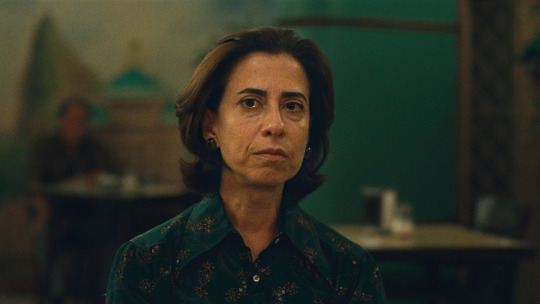
Fernanda Torres in 'I'm Still Here.' COURTESY OF VENICE FILM FESTIVAL
Walter Salles’ 1998 international breakthrough, Central Station, earned an Oscar nomination for the magnificent Fernanda Montenegro. Now in her 90s, the actress turns up toward the end of the director’s first feature in his native Brazil in 16 years, the shattering I’m Still Here(Ainda Estou Aqui), in a role that requires her to speak only through her expressive eyes. What makes the connection even more poignant is that she appears as the elderly, infirm version of the protagonist — a woman of quiet strength and resistance played by Montenegro’s daughter, Fernanda Torres, with extraordinary grace and dignity in the face of emotional suffering.
Many powerful films have been made about the 21 years of military dictatorship in Brazil, from 1964 through 1985, just as they have about similar oppressive regimes in neighboring South American countries like Chile, Argentina and Uruguay. The human rights abuses of systematic torture, murder and forced disappearances represent an open wound on the psyches of those nations, for which cinema has often served as a vessel for collective memory.
It’s not often, however, that the spirit of protest against the horrors of junta rule is viewed through such an intimate lens as I’m Still Here. That aspect is deepened by evidence throughout the film of Salles’ personal investment in the true story of the Paiva family after patriarch Rubens (Selton Mello), a former congressman, was taken from his Rio de Janeiro house in 1971, ostensibly to give a deposition, and never seen or heard from again.
Salles met the family in the late 1960s and spent a significant part of his youth in their home, which he credits as foundational to his cultural and political development. That accounts for the coursing vitality of the early scenes, as the five Paiva siblings dash back and forth between the house and the beach, and an extended family of friends of all ages seems to be constantly dropping by for drinks and meals and music and lively conversation.
There are sweet throwaway moments like two of the sisters dancing and singing along to the Serge Gainsbourg-Jane Birkin wispy make-out classic “Je t’aime … moi non plus,” without understanding the words. Just watching how one of the youngest kids, Marcelo (Guilherme Silveira), sweet-talks his way into keeping a stray dog they found on the beach conveys the warmth, spontaneity and affectionate scrappiness of the Paiva household dynamic. The young actors playing the kids are all disarmingly natural and appealing.
The first blunt intrusion into the family’s bubble of closeness and comfort comes when eldest daughter Vera (Valentina Herszage) is out with a group of friends and their car is pulled over at a tunnel roadblock. It’s a disturbing scene in which we see teenagers — just minutes earlier cruising along, sharing a joint and laughing — ordered at gunpoint to stand against a wall while military officers question them, searching their faces for any resemblance to the “terrorist killers” they’re looking to apprehend.
An occasional hushed phone conversation or private exchange with a friend suggests Rubens’ involvement in something that needs to be kept quiet. But the script by Murilo Hauser and Heitor Lorega, based on the book by Marcelo Rubens Paiva, saves those details until long after Rubens is taken into custody. That puts us in the same position as his wife and children, wondering what their father could possibly have done to place him in the regime’s crosshairs.
The chill of uncertainty is hardest on Rubens’ wife Eunice (Torres), who does what she can to hide what’s going on from the youngest kids. But having armed strangers in their house and a car parked across the street to keep a constant eye on them is tough to explain, and the older siblings are aware something is very wrong.
The situation escalates when Eunice is hauled off for interrogation. With Vera away in London with family friends, the next oldest, 15-year-old Eliana (Luiza Kozovski), is forced to accompany her mother, with bags put over their heads to keep them from knowing where they are being taken.
The interrogation scenes, set in a grim building with confinement cells, are harrowing. Eunice is sequestered for 12 days. Denied contact with the family lawyer, she’s kept completely in the dark about what’s happening to her daughter and is unable to learn where her husband is being held. She’s coerced over and over to identify people in photo files as possible insurgents, but aside from her husband, she recognizes only one woman who teaches at her daughter’s school. Her isolation and fear are made worse by the constant screams of people being tortured coming through the walls.
There are many moments of raw tenderness after Eunice is released — notably when one of her daughters watches from the bathroom doorway, her face a mix of sorrow and terror, as her mother showers away 12 days of grime.
With the government refusing to acknowledge even that her husband was arrested, Eunice continues fishing for information, talking to Rubens’ friends who tell her the military is “shooting blind,” going after random people based on almost nothing concrete. Unable to make bank withdrawals without her husband’s signature, she struggles to keep up with expenses. At the same time, she begins studying the family lawyer’s case file, foreshadowing her eventual decision to relocate with the five children to São Paulo and return to college.
The chief focus of Marcelo Rubens Paiva’s book is essentially his mother’s quiet heroism — first as she single-handedly shoulders the responsibility of keeping the family together and protected, concealing her grief when the inevitable is confirmed, and subsequently when she earns a law degree at 48 and becomes active in a number of causes. That includes pushing for full acknowledgment from authorities of disappeared people like Rubens after democracy is returned to the country.
Salles’ heartfelt film jumps forward 25 years and then by almost 20 more, allowing us to absorb Eunice’s self-reinvention not in big crusading speeches but simply in her dedication to the work of keeping memories alive and not letting the abuses of the past be swept away.
Perhaps the most beautifully observed arc of the film is the gradual rebuilding of the family. As the children grow up and marry and grandchildren come along, they transition back into a noisy, joyful clan much like the one depicted in carefree scenes at the start. Even the simple process of sorting through boxes of family photos is viewed as a loving act of reclamation in a final stretch that will have many audiences in tears.
Torres (one of the stars of Salles’ terrific early film, Foreign Land, co-directed with Daniela Thomas) is a model of eloquent restraint, showing Eunice’s private pain and her necessary fortitude by the subtlest of means. Only once during the film does she raise her voice in anger after a sad occurrence, beating on the windows of the parked car watching the house in Rio and screaming at the two stone-faced men inside.
The final scenes in which Montenegro steps into the role are bittersweet, as Eunice has become nonverbal and uses a wheelchair, in steep decline with Alzheimer’s. The poignancy is almost overwhelming as we watch her gently lean in, her eyes lighting up and a hint of a smile forming, when Rubens’ photograph appears in a television program on the heroes of the resistance.
The movie looks gorgeous. Adrian Teijido’s agile cinematography uses 35mm to great grainy effect to evoke the ‘70s and Super 8mm home movies shot during that decade provide lovely punctuation. The other key asset to the film is Warren Ellis’ score, which starts out pensive and quietly troubling before shifting almost imperceptibly into a much more emotional vein with the surge of feeling that accompanies the forward time jumps.
While it could use a less generic international title that’s not also a well-known Stephen Sondheim song, I’m Still Here is a gripping, profoundly touching film with a deep well of pathos. It’s one of Salles’ best.
#Brazil#TIFF 2024#Venice 2024#Venice Film Festival#Venice Film Festival 2024#Venice Film Festival Reviews#Venice Reviews#Walter Salles#Warren Ellis#Fernanda Torres#Selton Mello#Ainda Estou Aqui#I'm Still Here
47 notes
·
View notes
Text
FUN VALUE 62: The Eccentric Genius
youtube
Isn't it odd how firsts are seconds? As in, should we consider the order of exposure by FUN value or follower number? Though I suppose goners are not meant to be linear at all. This is why all of the Followers reiterate that central piece of the story, yet, each of them offer an unique perspective that helps us piece together not only Dr. W.D. Gaster's current condition, but who he is as a character.
No, there is no typical way to look at a character who defies the very notion of a written script. To be atypical among the already strange, to fit right in yet feel so obviously alien, the sole lump of hard coal among shiny gems.
It makes sense why ASGORE took so long to hire a new Royal Scientist.
After all, the old one... Dr. Gaster. What an act to follow!
They say he created the CORE.
Coal that burns the most effectively and brings light to all around him, in more ways than one. Impossible only until someone steps forward and makes it possible, to pursue the most absurd of ideas and be stared at with either unease or awe, to make it an act to follow.
From the occasional inconvenient property damage, the unecessarily bulky gadget that looks like it came straight out of a cartoon ...
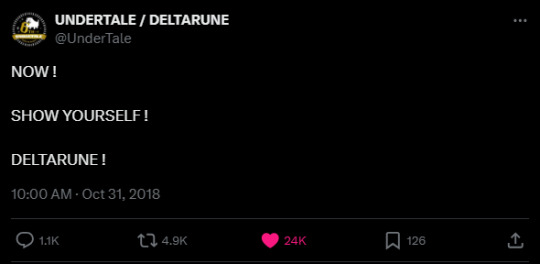
... to the grand opening speech nobody got a single word of but applauded for the flashy lights anyway.
However, his life... Was cut short.
One day, he fell into his creation, and...
Will Alphys end up the same way?
This bit can be particularly misleading at first glance, alluding to the idea of an accident or, possibly, a suicide of sorts. We already know how this bit played out, however, the mention of either instance is purposeful in a way the ideas complement each other.
To be special is to be strange, and loneliness is often the price of brilliance. It can be difficult to escape feelings of alienation when people seem to get along so naturally without having to make a conscious effort to understand and be understood. This parallel with Alphys isn't only due to their shared position, but the taxing demand for excellence that comes with it in exchange for belonging.
It wouldn't be a absurd to speculate that, possibly, Alphys would one day have a manic episode that would both be her greatest stunt and her last breath in this earth. Ah, but this is where they deviate, isn't it?
Beloved Dr. Wacky Dingus, too in love with life to leave it, yet never satisfied not to risk it - who continues to offer mystery and wonder, once through light, now through dark.
#FUN VALUE X#headcanons#wd gaster#gaster#undertale#deltarune#not sure i have articulated this like i wanted but hey#cinematic thinkers when they have to do descriptive writing:#left a bunch of things out because i meant to make this about this piece of dialogue alone ahh#only part 1 of a lengthy dissection of clues that lead up to ideas#anyway haha enjoy my thought process on characterization for this man#because this is about characterization i do not mean to get too deep into shattering what-is-going-on theories#i did it i named this collection it will be called fun value x#x values#like x files#i am so good at titles (not)#i love you mad scientist grandpa dnw you belong in my Heart#sigh can i jump to value 91 already i want to talk about goner kid so bad#this is my yeah he has a personality actually sorry#an entire charater archetype even (filing my nails cuntily)#pet peeve: “hah as if gaster has a personality that we know of” (vaporizing you with my comically large cartoon laser)#/lighthearted#but also /srs#its ok im here to spread the vision anyway
34 notes
·
View notes
Text
An Examination of Richard Mendelson
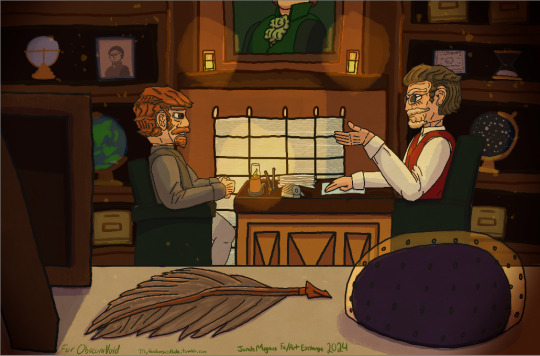
For @obscuravoid as part of the Jonah Magnus Fic/Art Exchange 2024
The institute’s halls were filled with stifled murmurs. The rustle of paper and scratching of pen, muted conversation filled the air with quiet contemplation.
A man strode through the vestibule and into the foyer, arriving at the near desk. He stood there, looking down at the worker entrenched in folders and lists as they filed paperwork. “Eh, hem.” The figure drew his hand to a fist and coughed, emphasizing his importance. The receptionist glanced up from their work, glaring at the newcomer. “Who are you?”
“Angus Stacey.” The man boasted. “I have an appointment with the Director of this institution.” He produced an envelope sealed with the institute’s sigil.
“Right…” The receptionist responded in feigned interest, hiding his own annoyance. “He’s currently engaged in a meeting right now. You may wait for him should you desire.” The receptionist pointed across the hallway to a couple of chairs adjacent to a large carved door fixed with the relief of an owl. “He should be done soon.”
Angus nodded at the man, then crossed the room to sit in the indicated chair. He settled comfortably into the seat, while he looked around the room admiring the architecture. He marveled at the construction of the walls and the vaulting of the ceiling, his vision trailed up to the paintings on the wall.
The first was an impressionistic painting hung imposingly on the wall with its heavy, dark varnished frame. It depicted an older man with tired, sunken eyes peering down through spectacles on his nose. He was dressed in a green suit, with brocaded accents. The brass plaque was etched in calligraphic script, ‘Founder, Jonah Magnus’.
The other painting was of the modernist style, framed in a simplistic metal, etched with a geometric art deco style. The figure was a younger lithe man with a wry smile. He wore a three piece suit with a double breasted vest, maroon with red pinstripes. The accompanying plaque, ‘Director, Richard Mendelson’.
Looking at the two paintings slightly unnerved Angus as he continued to wait. He idly scratched his chin as he observed the receptionist completing their work. In the corner of the room a grandfather clock ticked punctually away at the passage of time.
Tick.
Tick.
Tick.
Tick.
Click , went the handle belonging to the door next to him, snapping Angus of his concentration. His head jolted to see the source of the noise.
“And that’s how Mr. Fairchild finally made his investment in my future…” An old man with white hair and a cane stepped out of the office along with a familiar faced man.
“Fascinating as ever, Simon.” Richard said with a smile, which belied indifference. “You should really call the next time you're in town.”
“You know, I might.” The stranger, Simon, grinned. He looked across the room at the clock then to the side down at Angus. “Oh dear, the time flies… I do hope you haven’t been waiting too long for mister Mendelson here.”
While standing up from the chair Angus looked between the two men and shook his head.
Simon smiled widely, “Splendid, I do hope you have a brilliant day.” He held out a hand amiably which Angus accepted.
Angus's voice lilted in confusion, “Thank you.” He found that Simon’s hand was slightly chilly, as if a breeze scurried up his forearm.
“Simon…” Richard pointed, annoyed.
“Alright, alright I’ll be off.” Simon conceded, donning a top hat. He turned to Angus and winked. The tap of his cane against the floor echoed as he left through the doors.
“Come on in,” Richard beckoned, ushering Angus into his office.
The office was lit warmly with an orange glow from the few lamps in the corners in addition to the one illuminated on the central desk.
Richard sat in the leather chair and motioned for Angus to take the opposite one.
“Now I trust the missive informed you enough for the nature of the work that we do here.” Richard steepled his hands as he rested them on his desk.
“Of course, the transcription of oral testimony for collection and preservation is paramount for safeguarding the availability of information through time.” Angus replied.
“Correct, though it's customary that I must ask… what are you afraid of?” Richard leaned closer.
“I beg your pardon?” Angus cocked his head to a tilt, a chill rushed up his spine. “Why should that matter?”
“Because the subject matter we collect are of sensitive matters.” The corner of Richard’s lip drew up imperceptibly.
The back of Angus’s throat dried up, he stifled a cough. “Sensitive how?”
“Do you not know what it is we hold here?” Richard tilted his head quizzically.
Shaking his head, Angus spoke, “Folk stories, old maids tales..”
“Not quite.”
“Then what?” Angus demanded.
“Mr. Stacey…” Richard began.
----
For a drawn out moment Angus recalled sitting in his professor’s office, a quizzical look on his senior’s face.
“Mr. Stacy, surely you were informed about the selected presentation?” Spoke the professor.
“I believed it to be the one regarding the transcription process…” the pitch of his voice rose with a tinge of nervousness.
“Believed or knew?” The professor’s eyebrows raised as he cocked his head in interest.
“W-well… Tobias and the others told me…” Angus stammered.
“Let it not be the words of others that dictate what your studies should ought to be.” His old eyes narrowed, while pinching the bridge of his nose.
“I’m sorry, professor.” Angus bowed, crestfallen.
“You’re a bright lad, see that you don’t lose focus.” He tapped his temple.
“Yes, sir.”
“Unfortunately I must remove marks for the incorrect assignment, Mr. Stacey.”
----
“Mr. Stacey? ” Angus heard gently in the recesses of his mind as his attention snapped back to the present.
“Mr. Stacey…” Richard’s eyes focused as he repeated. “Are you quite alright?”
“Eh, hem. Yes sir.” Angus repeated hastily, composing himself amidst the conclusion of his daze. He struggled to recall what Richard had been asking him about, failing that, he opted to nod agreeably; a weak smile crossed his face.
“I trust that you have the requisite experience for the tasks I’ve outlined.” The corner of Richard’s lip twitched upward in a slight smirk.
Tiny rivulets of moisture pooled down the back of his suit. Angus nodded again with more vigour.
“Good.” Richard grinned. “Then I shall return to my earlier query, what are you afraid of?”
----
Echoing from another recess of his mind. An earlier memory floated up from childhood. A candle lit dormitory with several boys reclining in their bunks.
“Go on, Angus, tell us what you're afraid of…” Tobias’s eyes lit up with keen interest, wrapping his bed covers around himself like a nest. “We’ve all shared ours…” Tobias’s grin twisted stretched a bit too far across his chin, as he leaned closer.
Hackles pricked up his spine, Angus leant away reflexively. ‘Why must he always stare at me like that?', the question resonated through his thoughts. Angus glanced off to the side of Tobias’s face, to avert his returning eye contact. He struggled to confront his peer’s question. ‘I can’t really tell him the truth… Can I? No.’
“Well… I…” the youth swallowed down his nerves as he spoke up. Finally meeting Tobias’s penetrating gaze he exhaled heavily and weakly supplied, “… clowns.”
“Oh really, what makes them so scary?”
“I don’t like their make up… can’t trust them because they’re hiding themselves.”
“Well, well, well.” Tobias smirked. “Fascinating that is.” The memory faded back into the corner of his mind.
----
“Well…” Angus hesitated, “it’s clowns.”
Angus momentarily thought he saw Richard shift in his chair, leaning imperceptibly forward.
“What a rather strange thing to be afraid of.” Richard remarked and waived his hand dismissively, “but it’s not out of the ordinary.” Richard pressed his lips together in a small curt smile. “A rather pragmatic choice .” Richard stressed the final word, laden with weight, but Angus detected unexpected approval in Richard’s tone which unnerved him even more.
“Thank you?” Angus replied unsure if it was Richard’s desired response.
Richard coughed as he covered up a snort. “I do believe that brings our interview to a close.” Richard spoke, extending his hand out.
Angus, with trepidation, placed his hand in Richard’s and the pair shook.
“You’ll be informed if you’ve been selected for the position.” Richard replied with a broader smile.
Angus stood nervously and was ushered to the door by Richard. Richard’s hand appeared on his shoulder, squeezing lightly. “Be seeing you.”
Angus stepped out the office door, crumpled invitation in hand. Parchment soaked in moisture.
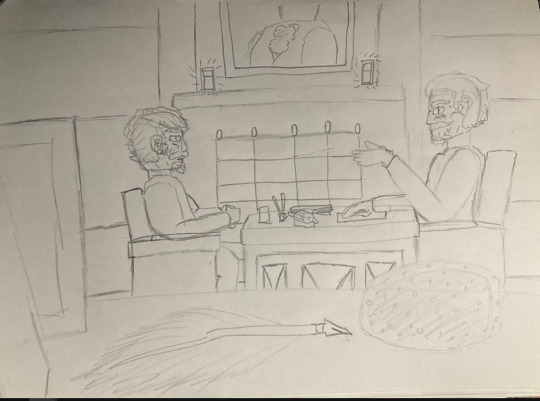
I wanted to draw something, and have a fic to go with it!
26 notes
·
View notes
Text
Monkey Business with Furfur
This is a 2024 Smut War meta
(NSFW? I tried to keep it reasonably clean, just filled with innuendo.)
Time to dig up some dirty dirt from before the Fall.
Memory problems? Oh, Hell no! There was no way Crowley was going admit to remembering this bit of history between him and Furfur, especially not in front of Aziraphale.
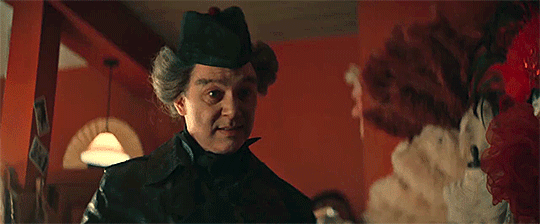

On the surface this incident with Furfur in the dressing room at the Windmill Theater adds weight to the appearance that Crowley has holes in his memory, just like Gabriel does during S2. But a closer look at the language being used during the post-magic show scene actually reveals quite the opposite - something that is - well, I shouldn't say totally unexpected because I've written about it tangentially before - but something that I think will shake up the way we view things between the three of them.
Firstly, lets review what I call the sub-story theme running underneath this section of the episode: King Arthur and Camelot. I talked about it length in my meta Once and Future Royalty. Here's the important paragraphs from that work for this particular meta:

Yes, poor old Furfur. Two's company, three's a crowd, as they say. Now we know we're in Camelot, we need to be reminded of the central tragedy of the Arthurian story, that ultimately led to the golden kingdom's fall. Lady Guinevere, Arthur's queen, famously loved Sir Lancelot, and the two were passionate lovers. It was essentially a love-triangle at the top, with Arthur being jilted, but he wouldn't/couldn't discard his queen. Where do we see this playing out in 1941? Furfur, pleased with himself for catching an angel and a demon in the act of consorting together (with the help of the zombies,) barges into the backstage dressing room, and confronts the lovers with their crime. But who is playing who in the Arthurian love triangle? I would say Furfur is clearly caught in the role of Arthur here. Consider the following exchange:
[See GIFs at top - I will quote relevant script shortly in detail]
Furfur claims a past intimate relationship with Crowley, which Crowley spurns offhandedly. Crowley is playing Guinevere here, jilting Furfur/Arthur, which leaves the demon-smiting Aziraphale standing in for the handsome hero Lancelot (with his French connections, no less), and doesn't he make us weak at the knees when he drops his voice an octave in dominating disgust. (Is it suddenly getting hot in here...?Phew!)
Recently someone posted more images of Furfur's costume, and the sash was shown reversed, where a red crown can clearly be seen under the stag's head, which to me just adds weight to the Furfur=Arthur role.
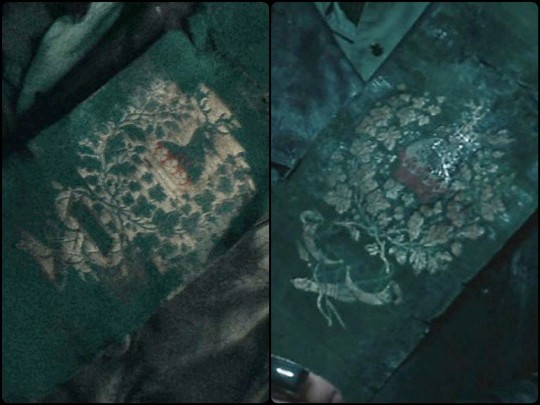
Next we need to take another look at this line from Furfur:
FURFUR: I was right next to you. We did loads together. You used to jump on me back, little monkey in the waistcoat.
Everyone took this too literally.
Really.
I mean really really.
There are two things - ok, three things - this set of lines tells us.
The first is the most obvious and likely the surface impression - maybe Crowley did turn himself into a monkey. But this is a misdirection to the real information here, so forget that. Put it to one side for the moment, at least.
Secondly, Furfur had a "monkey on his back."
We see by this turn of phrase that he was burdened by a problem, or something he couldn't let go of, and in this situation it clearly looks like a long held bitter feeling towards Crowley and his apparent freedom on Earth.
CROWLEY: Oh, we shan't, this is ridiculous. [leans back and puts hat over his face] FURFUR: No, what's ridiculous is demons like you doing what they please. And somehow still getting on, while demons like me graft for hundreds and hundreds of millennia and never get a sniff of a promotion! Well, not this time. Expect a Legion to come for you first thing tomorrow. Enjoy your last night on Earth.
Thirdly, the whole thing indicates there is a past history of "monkey business" between Furfur and Crowley, before the Fall. This is further emphasized by Furfur's greeting on arrival:
FURFUR: Hmm, well, well, well... What have we here? AZIRAPHALE: Sorry, have we met? FURFUR: Oh, no, you never had the pleasure, but... we have, haven't we? CROWLEY: Have we?
Ohhhh, Crowley. o_0 No, no, no, no, nooooooo..........
Can you see it? Can you see why he would deny knowing Furfur? That they did "loads together?"
Do you know what "monkey business" is an alternative phrase for?
Remember the Arthur/Guinevere/Lancelot love triangle?
Do you think Crowley is going to admit this in front of his angel?
Uh huh.
Really. Really really.
An "unreliable narrator" indeed.
#good omens#good omens 2#good omens meta#crowley#aziraphale#furfur#good omens 1941#1941 minisode#good omens after dark#goad#smut war#ineffable smut war#monkey business#monkey on your back#king arthur#camelot#you'll never look at that scene the same way again#bring on 1941 part III
67 notes
·
View notes
Note
Hello Mr.Haitch!
Hope you’re having a good weekend so far!
For me, Im feeling antsy because I haven’t been able to do what I want to these days. I have so many ideas for fics and so less time🥲
Anyhoo,
I have long noticed that when I write, I can easily come up with the blocking of the scene. Like where it’s taking place, at what time, the meaty descriptions, but what I always seem to struggle with is the dialogues.
Firstly, I think that I make them sound too clunky, or textbookish. I have tried mimicking some writers that I like (Haitch is THE best at that. I personally always love the way she writes the dialogues in her fics) but I dunno, they still end up feeling…unnatural to me?
Although this maybe me scrutinizing my own works a tad too much, because people who have read my works do say that my dialogues seem fine. I can’t help, but be bugged whenever I reread anything I wrote. Also it doesn’t help that English is my third language.
Weirdly enough, I primarily think in English, am very comfortable with it, and the dialogues seem just fine in my head. But when I read them out loud, it gets me squinting at them feeling like something’s missing.
Any advice or tips to get over this?
Thank you in advance.
And take your time answering it. These days I feel like a child bugging the adults, whenever I send you and Haitch an ask, knowing that you’re both busy🫠
Dialogue is one of the hardest things to get right, and developing your ear for it is frustratingly passive. The more people you talk to, in whatever language you're writing in, the better your dialogue will sound.
It needs to be authentic, it needs to carry the character's personality, but it also needs to have weight. Some authors will insist on total accuracy - that characters need to sound like real people, except real people rarely speak on metaphors, not do they (usually) say something that will later prove significant. Most times people just talk for the sake of talking.
Two authors I'd heavily recommend studying, just because I think they've got the balance dead-on, are Alan Garner and Cormac McCarthy. A good starting place for both is The Owl Service (Alan Garner) and No Country for Old Men (McCarthy). Every line is a live wire. Every exchange is alive but still weighty, either advancing the plot or revealing the character.
Case in point: one of the central tensions in The Owl Service is between Gwyn (local Welsh lad who works in the house, very working class but dreams of better), and Roger (posh boy, everything given to him on a plate). Their exchanges are brilliantly conceived - Gwyn's frustrations, bitterness, and fear of being judged or patronised come through in the most mundane of exchanges. Sadly, Garner isn't well known or studied - especially outside of the area I grew up in where he is something of a local celebrity.
If you like The Owl Service, and fancy a challenge (and a lot of angst, heartbreak, and discomfort) I'd try Red Shift.
General rules of thumb for now:
1) Every character must want something - both in general and from a conversation, even if it's just to spend time with a friend. Figure out what that is.
2) What isn't said in dialogue is often more important than what is said. Is there something a character doesn't want to talk about? Can you create a heavy absence in their exchanges? Something the reader can see but the characters themselves ignore or refuse to acknowledge.
3) Eavesdrop on people in public places. Spend some time in a park, a cafe, a bar, or even a public square with no distractions and listen to how people talk. Focus on the beat and the rhythm, try to deduce things about people from what they talk about, how they talk about it, and - as I've said - what they absolutely won't say.
4) One that helped me was watching films, films I know back to front, with subtitles on. Really focus on the words - how they're said, when they say it. If there's a scene or an exchange that resonates with you, find the script and try to figure out why and how it works.
I'll give you an example:
youtube
This is a great exchange from one of my favourite films, The Assassination of Jesse James by the Coward Robert Ford. Great film, you'll never look at Brad Pitt the same way again.
Anyway: at this point in the film, James and his gang have committed their final train robbery and gone their separate ways. James is, however, growing paranoid - convinced that he's being hunted and someone has ratted him out. One by one, he works his way through his old comrades to get to the truth.
James's dialogue in this scene is excellent, and is a solid example on how to establish a power dynamic between two characters. He barely talks, only occasionally repeating a word or two when Ed Miller has finished talking. He's quiet, probing, but mostly silent. Ed gives him everything, he blathers and rambles out of fear, trying to fill the silence, and with each word he ties his own noose all the tighter. Ed's fear and James's silence serve to establish just how dangerous James is, and the degree of trouble Ed is in.
It's a great example of something my PHD tutor impressed on me: power doesn't talk. It doesn't have to. Power makes you talk, give everything up, and then decides what to do with you.
You'll have your own favourites, of course, but this is just to give you an idea.
7 notes
·
View notes
Text

The casting of Mel Gibson as the volatile Riggs and Danny Glover as the cautious Murtaugh perfectly matched Shane Black's vision for "Lethal Weapon," released in 1987. However, their iconic pairing wasn’t a foregone conclusion. Director Richard Donner, known for his meticulous approach to filmmaking, insisted on a chemistry test to ensure the duo could embody the nuanced relationship that lay at the heart of the script. This decision was pivotal, as "Lethal Weapon" hinged on the believable interplay between its two protagonists, blending camaraderie, conflict, and emotional depth.
Donner arranged the chemistry test in a casual, low-pressure environment, allowing both actors to explore their characters and interact freely. Improvisation was central to this process. Gibson, with his raw energy and unpredictable edge, immediately dove into the persona of Martin Riggs, a cop teetering on the edge of self-destruction. Glover, on the other hand, brought a measured, grounded presence to Roger Murtaugh, a seasoned detective juggling the demands of his career and family. As they began to play off each other, the sparks of something extraordinary became evident.
Donner later recounted how their contrasting energies created an almost electric synergy. Gibson’s intensity and Glover’s steadiness complemented each other in ways that transcended the script. Riggs and Murtaugh were not just partners; they were foils to each other, highlighting strengths and vulnerabilities in a way that felt authentic. This dynamic was exactly what Shane Black’s story required, a balance of humor, tension, and emotional resonance.
One memorable moment during the chemistry test involved an improvised argument between the two actors. Gibson’s portrayal of Riggs’s impulsiveness clashed brilliantly with Glover’s exasperated, "I’m too old for this" demeanor. This interaction encapsulated the core of their on-screen relationship: a reluctant partnership that evolved into an unbreakable bond. Donner was convinced. The decision to cast them was made, and it would prove transformative for both their careers and the buddy-cop genre.
As production began, the chemistry between Gibson and Glover continued to deepen, both on and off the screen. They developed a mutual respect and friendship that mirrored the growing connection between Riggs and Murtaugh. This authenticity resonated with audiences, making their partnership the emotional anchor of the film. Scenes like Riggs saving Murtaugh’s daughter or their banter about age and responsibility felt organic because of the trust and rapport the actors shared.
Beyond the script, their improvisations added layers to their characters. For instance, many of the humorous exchanges in the film were unscripted, a testament to their ability to inhabit their roles so fully. This creative freedom enriched "Lethal Weapon," elevating it from a standard action film to a cultural touchstone. The natural rhythm of their conversations made Riggs and Murtaugh feel less like characters and more like real people, grappling with real struggles.
The success of the first "Lethal Weapon" laid the foundation for a franchise that spanned four films, with Gibson and Glover reprising their roles in each installment. Their chemistry remained the defining element of the series, even as the stakes and storylines evolved. While explosive action sequences and sharp writing were significant draws, it was the human connection between Riggs and Murtaugh that kept audiences invested.
The casting of Mel Gibson and Danny Glover remains a masterclass in recognizing and fostering on-screen chemistry. Donner’s insistence on the chemistry test was a testament to his understanding of what "Lethal Weapon" needed to succeed. It wasn’t just about finding two capable actors; it was about finding two individuals who could create magic together. That magic not only defined "Lethal Weapon" but also set a new standard for the buddy-cop genre.
Their pairing proved that great storytelling relies as much on the intangible spark between actors as it does on plot or dialogue. Gibson and Glover’s dynamic brought heart and humanity to the high-octane action, making "Lethal Weapon" a cinematic classic. The chemistry test wasn’t just a casting formality, it was the moment that ensured the film’s legacy.
4 notes
·
View notes
Text
FGO/PM Mirror-World
Master Candidate number 48. The young man stood in the hallway of Chaldea, almost pouting, having been kicked out of orientation by the Ms. Director. He'd barely gotten to meet one of the other candidates before passing out, and he was being punished for it. That wasn't how things were supposed to go for his first day, but something about it also felt oddly right. The Flow, as he called it, called for him to go elsewhere. The other candidate- What was their name? Dante?- Had suggested he go lay down for a while with a sneer, so he may as well. He could always catch up on the orientation later.
He'd barely gotten to meet Doctor Garnet before alarms blared. Central Command had caught fire, and the Doctor had already run off. Then and there, the young candidate decided to go with him. The Flow be damned. People needed help!
There! In the rubble, Dante's body!
He tried his best to push it off of them, but it was no use. Their head was probably crushed, but they were still moving. As the computer continued to read off scripts, he grabbed Dante's hand. He could at least be there for them, even as everything went black.
--
He heard a clock in his ear, yet didn't. He heard words, but no voice.
<"Wake up! Do I use the official title?? Master Vergilius?? Wake up before I kill you!">
That woke him up quickly.
"What?"
Dante had a bright red clock for a head with flames completely dissimilar to the fires surrounding them. He forgot what they looked like before, but it wasn't that! The ticking was new, too.
<"Uhm. Sorry, I don't know where that came from!">
They rubbed their neck and turned their entire head to look at the ground. They hadn't been in combat garb earlier… Just lab gear. And were they being… Nicer than before?
<"Please work with me! We have threats coming in!">
--
According to Dante, they had fused with a Servant at the last moment, but they didn't recall much prior to that. In exchange for their memory, they'd been granted the power of a Servant. Servants needed a Master to survive, and they'd chosen him for their Master.
Him, a Master… A real, proper Master! The things he could change as a Master were countless, to say the least!
--
They survived, and he was the last Master alive. The fate of the City was on him, now. Him, and the rest of the staff. Doctor Garnet was promoted to Temporary Director, there being almost no one else alive. Despite his cowardice and inexperience, he had the makings of a good leader.
There was Caster Lapis, who he hadn't met before this point. She was brutally honest with him, and he liked that. She was now Second-in-Command, despite being a Servant.
And then there was Dante, who had been following him around like a lost puppy since they'd gotten back. There was nothing anyone was able to do about the memory loss- That'd been their own decision- But they seemed to retain faculties just fine despite the clock.
The Flow didn't stop. It would be followed until it ended.
----
"We're going to settle this now, Dragon Witch!" Ruler Faust cried.
"Shut up! Let's fight!" yelled Faust Alter, "Will despair win, or will hope win? Will murderous intent win, or will pity win? Let's see if you can surpass me, Me who gave up everything!"
Hope would win, of course. Vergilius was certain of that, and Dante resolutely stood by his side. They would win. The Flow continued on."
----
Are you going to stand in my way?" the opposition named Jia Huan calmly asked, staring Vergilius straight in the eyes.
"That's why we're here."
"I'll stand in your way as well," the still-living Hong Lu agreed, brandishing his spear. "The world is brimming with beauty. Flowers, songs, jade, love… And you'd destroy it all? Isn't that wasteful?"
Dante was still by his side, chained shield at the ready. They would win. The Flow continued on.
----
The enemy mage, the crazed Captain Ahab, had overwritten her last crewmate with the Identity of a Demon, and it now towered over them all with its hundreds of eyes on it's pallid body. Queequeg was no more, replaced with the monstrosity of the sea.
"If it can be hit, it can be defeated!," Captain Ishmael (Rider) declared, reloading her pistol. She could see it's heart, and she knew that it was her true target- Not the pathetic mage that summoned it.
"Come, Dante! This is our last battle together!"
She clapped her free hand on Dante's armored shoulder, a wide grin on her face.
"This is it! Be brave! Laugh those fears away! "
"Let's go, Dante!" Vergilius announced, pointing at their enemies.
<"Yes, Master! Commencing correction!">
They would win. The Flow continued on.
----
"Something is manifesting!" Dr. Garnet warned, "Something" is coming! It's an unknown phenomenon! Not a Servant manifestation! Unknown? No, it's actually more like a Rayshift? But that's impossible. Only we have that technology!"
Next to Vergilius, Dante shivered despite their coat.
<"Senpai, something's wrong here. I can't detect anything, but I'm freezing.">
Before them, the true enemy approached, wrapped in shadow. Vergil's companions of the Singularity all flinched away… And moments later, a branch had beheaded the nearest one.
Beside them, Saber Gregor cried out and threw himself at the manifestation that had named itself "Solomon". A single entity swatted him aside as easily as one would a fly.
"The only one that interests me here is the one with the clock," Solomon stated plainly. "Out of respect for your pure heart, I'll only bring four of them here with me. Show me everything you can do."
They wouldn't win, but they would survive. The Flow continued on.
----
"Let's get it started," the Effloresced man stated, his scythe at the ready.
"You don't intend to hand over the Bough, do you?" Assassin Yi Sang asked, already knowing the answer. His knife was already prepared for combat.
"Of course not. It's time to harvest the rewards I've rightfully earned. The past will be replaced."
Vergilius didn't need to be told that this was the final battle of the Singularity. Beside him, Dante stood as always.
<"Let's go, Vergil! Bring us victory again!">
They would win. The Flow continued on.
----
"I have this duty to stop you!" yelled out Heathcliff, brandishing the sword that would soon end his life. "As the Heathcliff that will end this accursed cycle! You won't take my Catherine from me, you fake deity twat!"
The opposing Catherine in white simply tilted her head as if she didn't understand. She didn't understand why Heathcliff had tears running down his face, or why she was being opposed. This was for everyone, wasn't it?
"Give me your final orders, Sir Vergilius! Let us end this. No one else should have to go through this."
Vergil looked at the ground briefly, then back to Heathcliff. Neither of them knew that Heathcliff would become a Servant after this by the will of the river deity, but this had to be done.
"If that's what you want to do, we're with you."
<"I'll do anything to help you, my Heathcliff!"> Dante chimed in, holding the burnt Holy Bough like a weapon, <"Our final enemy here is Ever'y Catherine! Let's finish correcting this mansion, Master!">
They would win. The Flow continued on.
----
"From the fiery abyss, I come, and only death do I bring. My name is Ryoshu, and you will be part of my canvas."
"I can't believe this!," Dr. Garnet chimed in from communications, pushing Lapis off screen entirely, "It's able to be killed now! Now, now! Vergilius, now is the time!"
"We've found the weakness!" Lapis announced offscreen, "It's the head! That Abnormality's weak point is in it's head!
"And now that she knows that she is mortal, she is fleeing," Grand Caster Meursault added, the tiniest smile gracing his usually stone-cold face. "Now is the time. This is the last chance we get. The storm is closing in. We can speak later. Prepare to fight."
<"Of course, Sir! This is the final battle of the Seventh Singularity! This is for all our friends who believed in us, and for King Outis! Let's do whatever's necessary to defeat that ALEPH!">
"Of course!"
On the sidelines, Mistress Rodion had finally regained control over her icy underworld. She willingly gave full permission to fight for the first, and possibly last time. Humanity would survive this.
They would win. The Flow continued on.
----
"Be careful, Vergilius! He's right in front of you!" crowed Lapis over the comms, panicked.
"I know," Vergilius responded, watching the false Solomon approach. "Solomon", true name Jumsoon, slowly strode up to him despite the failure of his lab, fully Distorted.
"We've both lost everything here," Vergilius plainly stated, holding Dante's shield at the ready. Garnet had sacrificed himself moments before to foil Hermann's plot, and Dante had been incinerated saving Vergilius' life. He barely had any reason to want to go on, but failing to would be a waste of the sacrifices.
"Everything here has been a waste, yes," Jumsoon agreed, his tail irritibly flicking about.
"I am all that remains here. There's nothing left but for one of us to be hung on the portrait wall, and the other to live. …My sworn enemy. My hatred. My destiny. I want you to witness this. This brief moment is now my story. This brief but precious time has given the creature called Jumsoon true life."
With all he wanted said, Jumsoon Effloresced.
--
Of course he won, and the Flow directed Vergilius to the Rayshift point. He wasn't going to make it-
<"Master, take my hand!!">
They both survived. They had won, and yet… The Flow did not stop.
--
Oh. OH.
--
With one success, a new threat emerged, wiping all progress and the City with it. The only survivors were "The Red-Gaze" Vergilius, Shielder Dante, and a few crew members. All Servants had been wiped away. Lapis had been killed in combat.
She'd predicted this and left a clone of herself to act in her stead, codenamed Charon. Charon's job was to drive New Chaldea's transportation- Named the Mephistopheles by Faust- to clear this new threat.
"This drags," Lancer Rodion complained from her seat, filing her axe.
<"HOW ARE YOU HERE?!"> Dante screamed, jumping so high that they nearly escaped their bandages.
"A bunch of us are," Rodion laughed, gesturing to the door at the back.
As Vergilius threw it open, a bunch of Servants they'd befriended poured out and ganged around him.
"Sir Vergilius! Tis fortunate to see you again!" yelled the Lancer Don Quixote of the second Sub-Singularity. She was so loud he couldn't hear anyone else.
<"You guys made it!!"> Dante cheerfully rang over her, and the Servants started to gang them instead.
Vergilius sighed in relief. Not everything was lost yet. It had come very close, but there was still some hope. They would win. The Flow continued on.
----
It was so, so hard. Millions of people killed just to restore the City they knew. The deaths were on Vergilius' hands. It didn't feel worth it to be a Grand Master with a title anymore. He never wanted this, but the Flow never stopped. He had to, they all had to Sin to get back the world they knew.
Next to him as always, Dante rested their head against his shoulder. They didn't need to speak. Vergilius knew what they were going to say. That they could do it. That everything would be right in the end.
Vergilius was so, so jaded compared to when he'd started, and yet… He knew they were right. It would end eventually. The Flow hadn't stopped, so they would win. They would survive, no matter what.
12 notes
·
View notes